GCSE OPTIONS 2023
Stanstead Road, London SE6 4TY
Charity number: 312747
www.stdunstans.org.uk
020 8516 7200
Contents
Core subjects
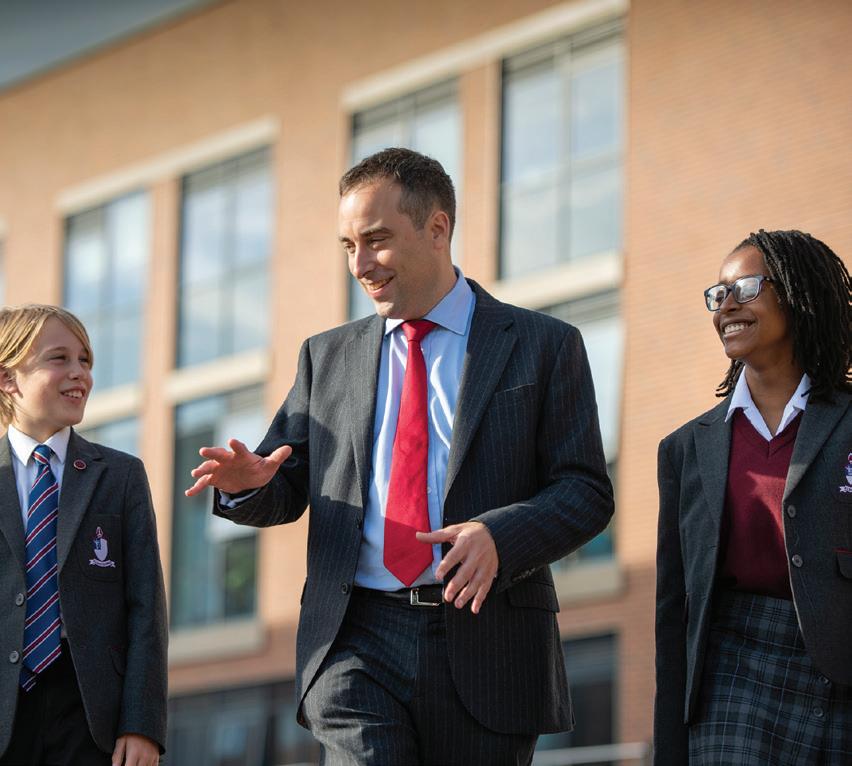
• English Literature and Language
• Mathematics
• Sciences
• LanguagesModern Foreign Languages: French, German & Spanish or Latin Options subjects
• Art and Design
• Classical Civilisation
• Computer Science
• Design Engineering
• Drama and Theatre Studies
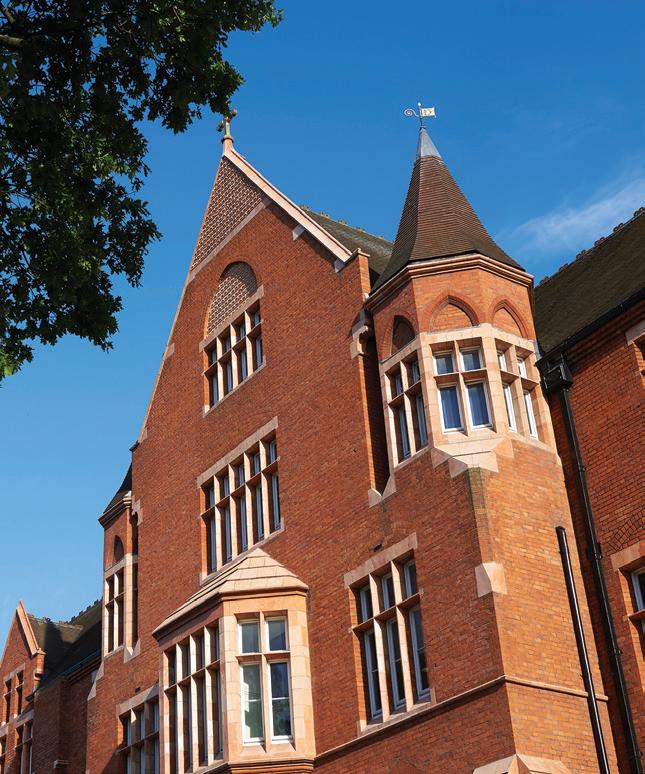
• Geography
• History
• Music
• Physical Education
• Religion, Philosophy and Ethics (Religious Studies)
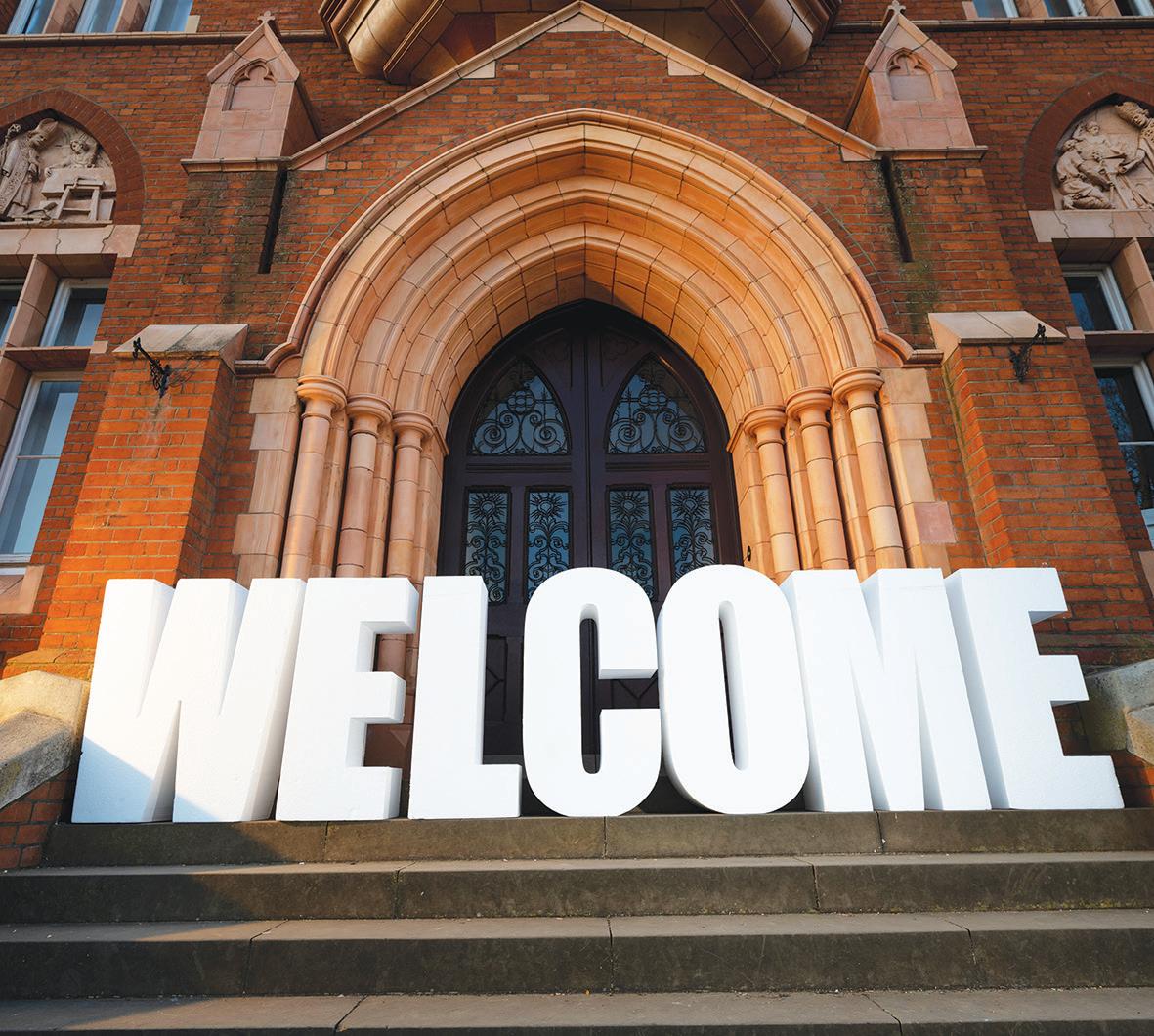
ST DUNSTAN’S COLLEGE I GCSE OPTIONS 2023 2
Introduction
Dear Year 9, September will arrive quickly. When it does, you will be in Year 10 studying ten subjects, all of which you will be expecting to do well at, in GCSE or IGCSE examinations at the end of Year 11. The aim of this booklet is to give you information about the subject choices available to you. Please read it carefully and use it to support informed decisions. Enjoying your GCSE studies and achieving the strongest grade profile across them all is the goal; above all I would recommend you chose subjects in which you have received strong learning and attainment scores, and ones that have content you enjoy at Year 9.
Because you will not sit AS examinations at St Dunstan’s at the end of Year 12, your GCSE grades will be the only public examination results visible to universities (and employers) when you make applications to them in Year 13. That may seem like a long time away, but you should be aware now; strong grades across your subjects, and not just in your favourite few, will matter. Never has this outcome been more important to work towards, and so the choices you make now must be made carefully. The school will help you with this, and you must help yourself too.
The Middle School (Years 10 and 11) is a time of growing independence, responsibility, and choice. Making informed decisions now and through Years 10 and 11 is the way to give yourself greater opportunities later – over A Levels, universities, and careers. Before going into more detail about the subject choices, it is also important to remember that a healthy, successful, and enjoyable future is built on more than just academic results. In the Middle School there will be plenty of opportunities for you to develop other talents, knowledge, skills and interests. We expect you to stay involved in our vibrant Forder co-curricular programme, and to become more self-reliant and confident; to acquire greater experience in leadership and to undertake more responsibility within the College. You should also see the Middle School years as vital foundations for any competitive applications you might wish to make in Year 13, be that to Oxford, Cambridge, or courses such as Medicine, Veterinary Science, Dentistry, Engineering, etc. Our thriving ‘Aiming High’ programme is open to students in Years 10 and 11, and Medical Society is a must attend for all students with future applications for medical related degrees.
CHOOSING YOUR OPTIONS
Back to the subjects - the key purpose of this booklet! You will study courses leading to GCSE or IGCSE examinations in a ‘core’ of subjects expected by employers and universities to be at the heart of a young person’s GCSE profile, whatever his or her ultimate ambitions. That core is:
• Mathematics
• English Language
• English Literature
• Sciences - Biology, Physics and Chemistry (students will study all three sciences, either on the Double Award pathway (resulting in 2 GCSEs) or the Triple Award pathway (resulting in 3 GCSEs); you will be given advice over which pathways is most suitable for you before the start of Year 10 and again before the start of Year 11.
• Either a Modern Language (chosen from French, German, or Spanish, continuing with your Year 8 and Year 9 MFL option) or Latin (if you have opted for this in Year 9). If you have engaged successfully with the Dual Linguist programme through Forder then you can also pick a second MFL as one of your three options.
In addition to your ten subject choices, your curriculum time in Year 10 will include Games. Sport and Exercise Science (SES) will only be examined if you choose it as a specific GCSE subject. Games is not examined.
There is no one right way to make your choices. You may find it useful to ask yourself these questions, however:
• What do I enjoy studying the most?
• What am I achieving the best in, thinking about both my learning and attainment scores?
• Do I want to keep a wide balance of subject areas (humanities and creatives)?
• Are some subjects examined in a way that suits me more or less (such as via coursework, or not)?
These are all insightful questions to ask yourself and to raise with your teachers. Please think carefully about your GCSE choices, and do discuss them with teachers and parents, as well as friends.
Full details on how to submit your choices using our online system will be made available after options evening. Full details on how to submit your choices using our online system will be made available after options evening.
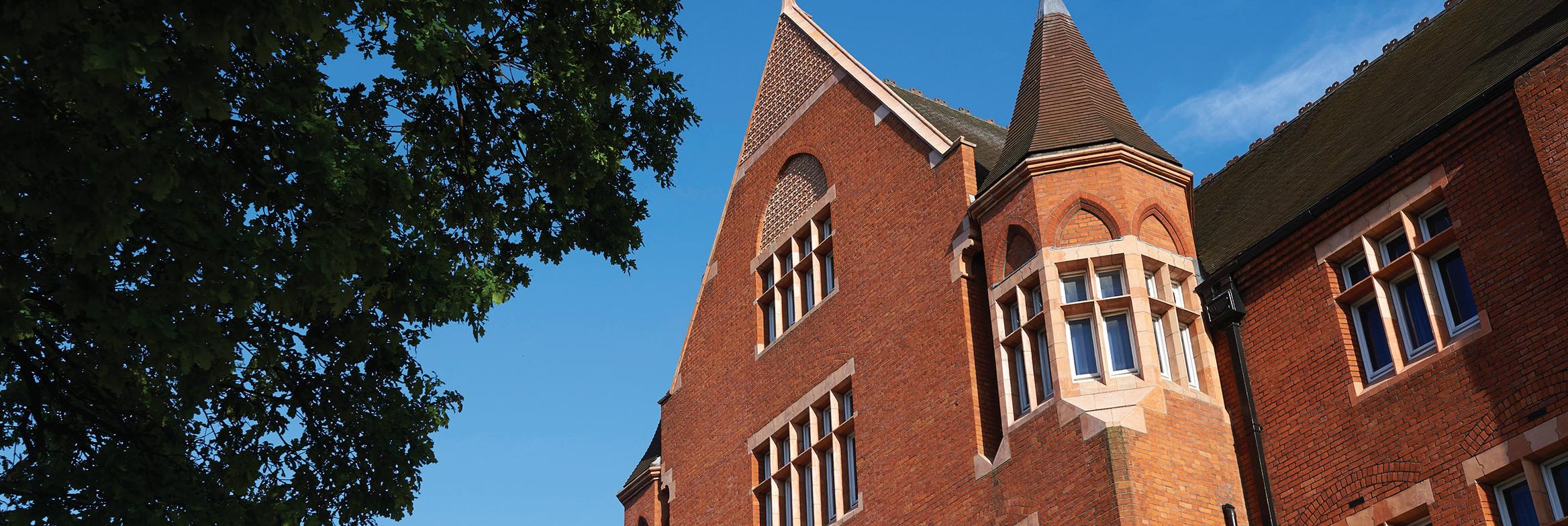
www.stdunstans.org.uk 3
ARE THERE RESTRICTIONS ON THE SUBJECTS THAT MAY BE CHOSEN?

In so far as possible, we give you free choice. We expect to be able to give you what you choose on your form. On rare occasions it might not always be possible to allocate a student to all their first three choices due to timetabling or other constraints. This is unusual, and please assume it will not happen. If it does happen to you, we will be in touch with you and your parents before Year 10 begins to discuss the situation and the options available to you.
CAN YOU CHANGE YOUR MIND?
We create the timetable based on the original choices made. If you change your mind after submission of your original choices, we will make a note of the new request and review it in August to see if it can be accommodated within the timetable that has been created. We will not adjust the lists and timetable planning from the original choices between now and August. You will understand that re-planning timetables every time any individual changes their mind would make the process impossible to complete effectively. What this means is that we cannot guarantee that changes will be possible to accommodate, but we will try if you have requested them. Please do, therefore, make the choices now that to the very best of your consideration, you intend to stick with.
GCSE OPTIONS DEADLINE
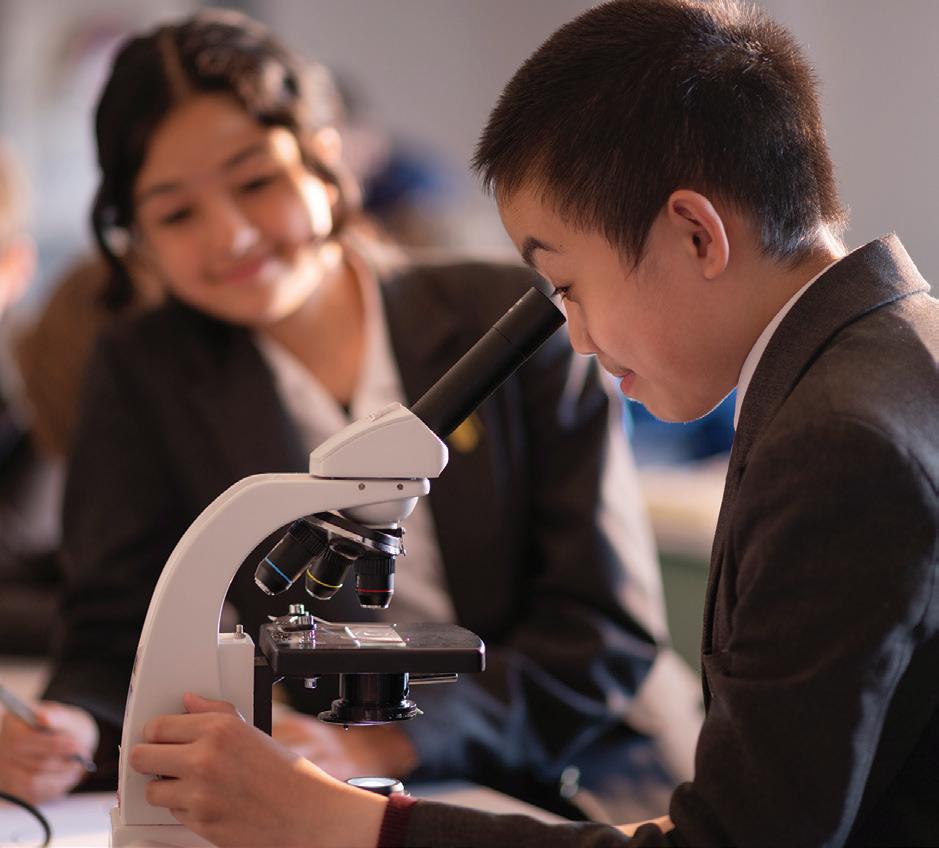
We ask that you complete the online form on or before Friday 10 March 2023. Shortly after options evening full instructions will be sent to parents and carers outlining how to use our online form.
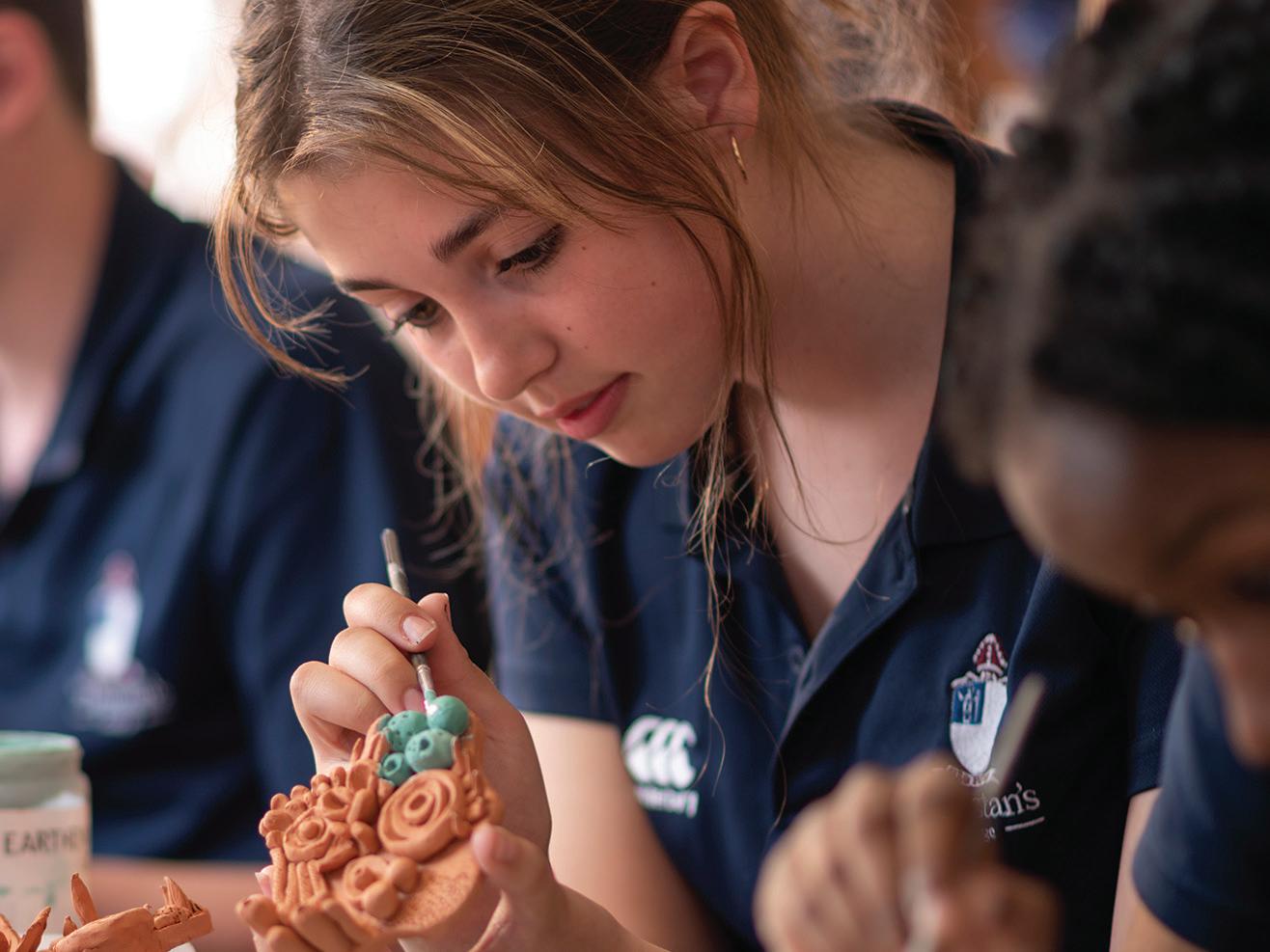
LOOKING AHEAD
The College looks forward to celebrating your achievements by the end of Year 11 based on the choices you make. Our expectation is that you will complete your ten chosen subjects and meet our entry requirements into Sixth Form; the vast majority of students at the school exceed this minimum level of attainment to transition automatically in our Sixth Form considerably. In the rare circumstances where evidence in Years 10 and 11 suggests a student is not on track to meet this level and have these options available to them, the school will offer academic support and educational advice over how best to proceed. If the situation persists, our advice and expectation may be that you withdraw from one or two appropriate subjects to support best achievement in the rest. Our priority will always be to support students to a position where they have choices at the end of Year 11 based on as strong an overall GCSE profile as possible.
Thank you very much in advance for your careful decision making at this important and exciting time. We, as a school, look forward to advising and supporting you.
Mr J Holmes Deputy Head (Academic)

4 ST DUNSTAN’S COLLEGE I GCSE OPTIONS 2023
Introduction to Middle School
Mr Holmes has introduced you to the academic pathways and decisions you are making as you indicate your GCSE options. As Head of Middle School, I would like to outline some of the other elements which make up your Middle School journey. First, some familiarity: tutor time will continue to deliver the pastoral support you need, with time each day to examine and discuss issues arising from the Theme of the Week, circle time discussions, Usherwood and Stuart lessons. You should look to share your enthusiasms and life interests during form time: this helps make up the rich community which we are privileged to share here at St Dunstan’s College. Your tutor will, as in Lower School, work with you to choose exciting, varied and challenging Forder activities, which develop you as an individual and help make up the shield mentioned in our ‘Albam Exorna’ motto. You will continue as a member of a House and will be expected not just to contribute but also increasingly to the lead, taking charge of specific House and charitable initiatives, organising and encouraging other students to participate and thrive.
You will also experience some change from the Lower School, which are all a key part of your journey through the College. Years 10 and 11 have six forms each year, which means you will have a new form and new form tutor. The Middle School tutors are experienced teachers, who have worked with Middle School students and understand their individual challenges. Your day will feel different, too: instead of all the tutor group members experiencing the same timetable, you will all have different timetables, depending on your GCSE profile. This means that, while of course you will benefit from studying in a community, you will be following your own unique path through each day and Middle School as a whole.
To support you through the Middle School, your tutor will get to know you well: the STARS process after Learning Scores and Attainment Scores will require you and your tutor to review your learning habits and progress. As you learn more about your academic subjects, and your own skills and capabilities, you will also learn how to improve your study skills, and how to manage your time outside school and revise effectively. In Year 10, we also encourage you to look beyond the Middle School; your tutor will advertise the many events and opportunities for Careers, Higher Education and the ways that St Dunstan’s College Sixth Form can help you turn your dreams into real life pathways.
So, please take advantage of the information provided here and choose options which will make up your unique journey through the Middle School and beyond. I look forward, along with the whole Middle School team, to welcoming you into Year 10 very soon.
Miss L Clewley Assistant Head – Head of Middle School
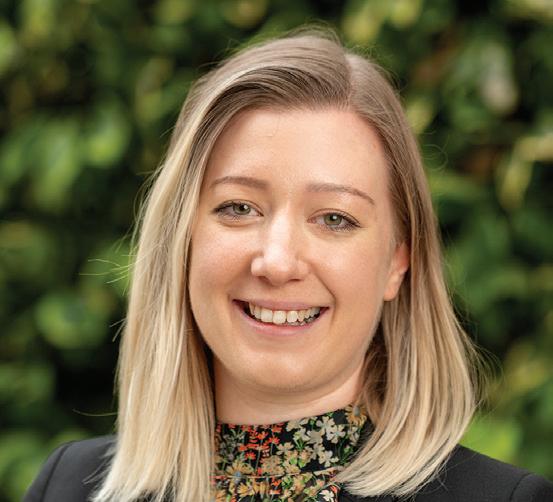
5 www.stdunstans.org.uk
Core subjects
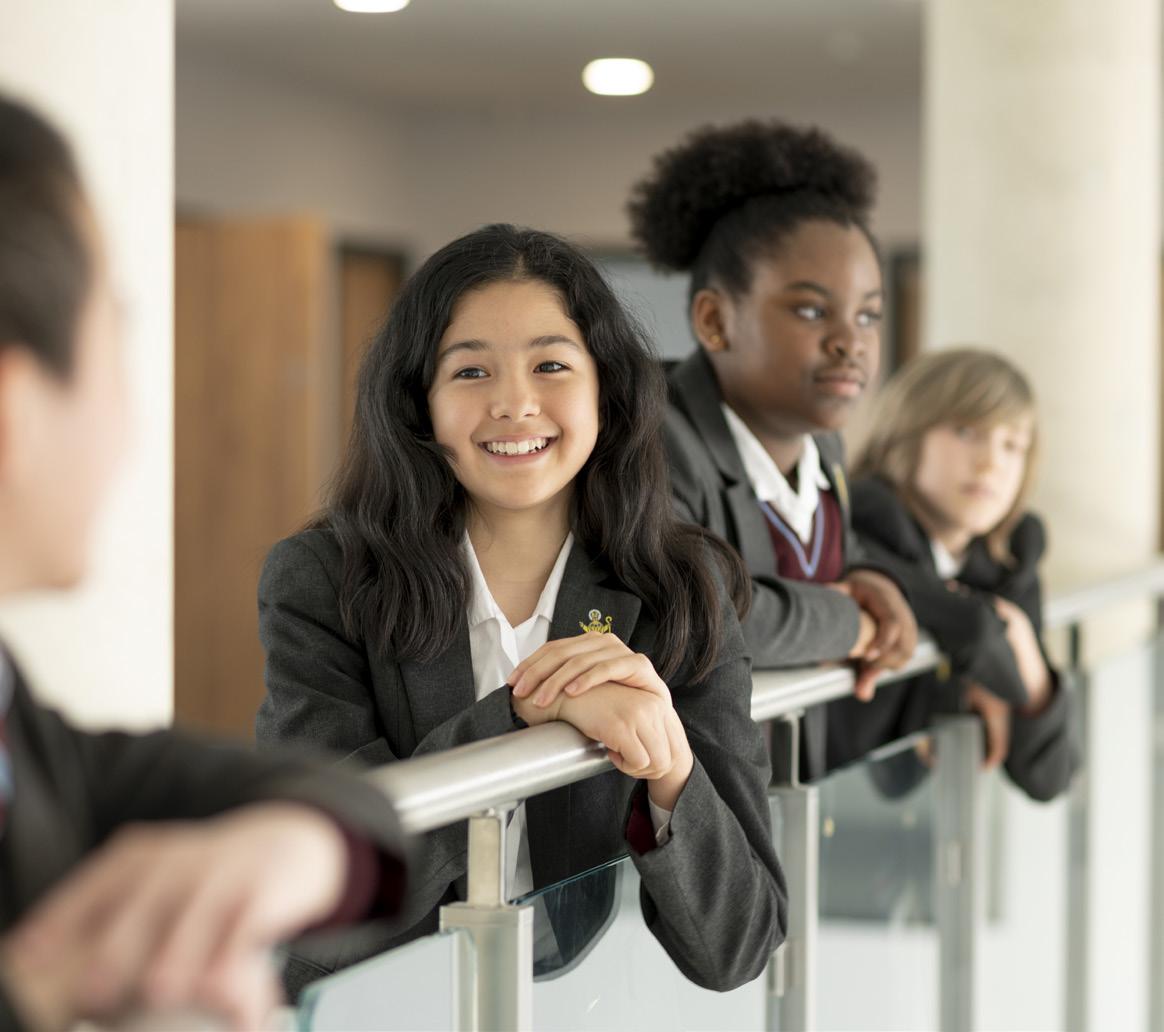

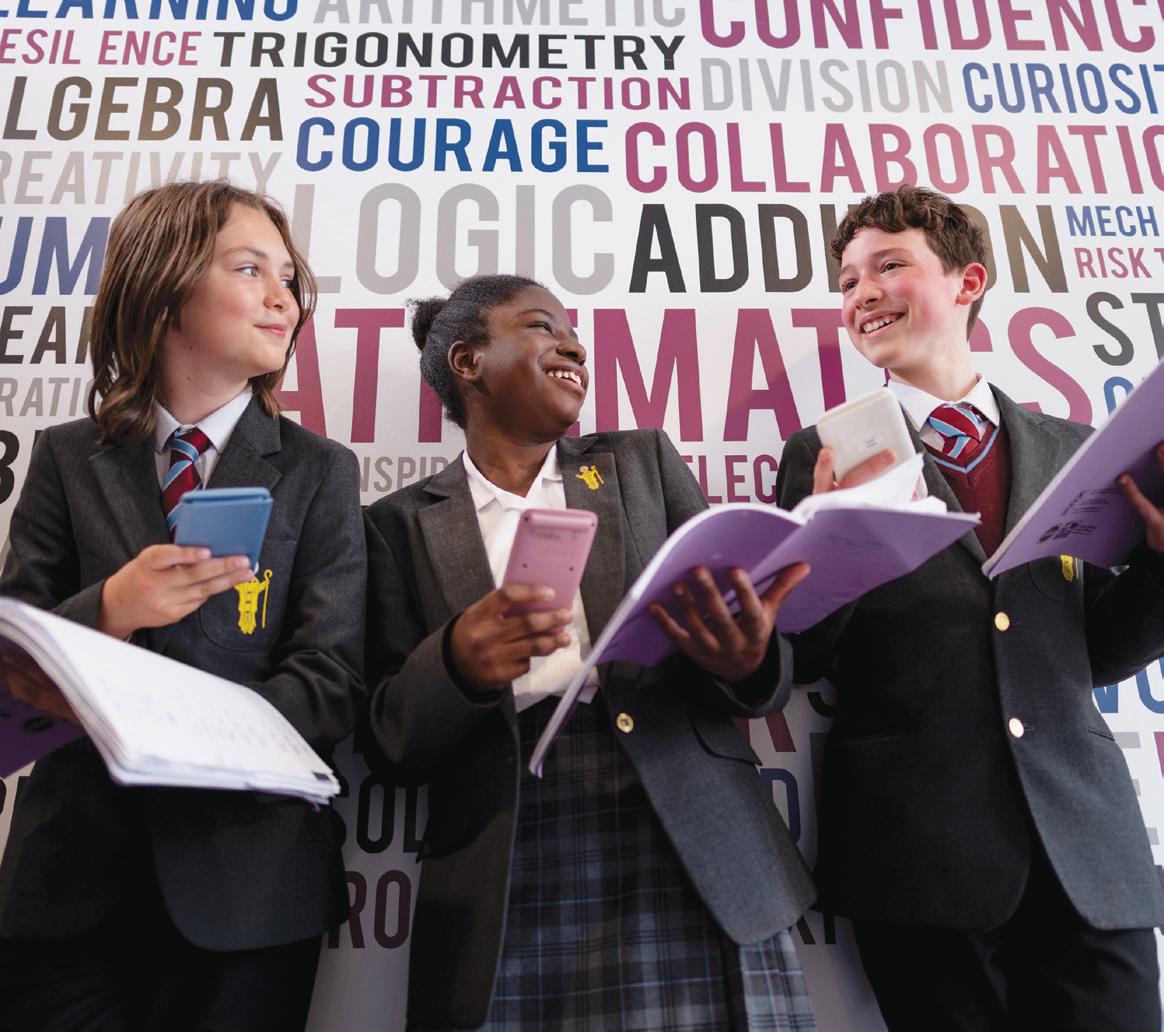
6 ST DUNSTAN’S COLLEGE I GCSE OPTIONS 2023
English Language and English Literature
AQA GCSE English Language and English Literature
Students study AQA courses in both English Language and English Literature which lead to two GCSE awards at the end of Year 11.
Content
English Language
Two external examinations that count for 100 % of the total GCSE English Language mark.
Paper 1: Explorations in Creative Reading and Writing (1 hour 45 minutes) 50%
Section A Reading: one unseen literature fiction text.
Section B Writing: descriptive or narrative writing.
Paper 2: Writers’ Viewpoints and Perspectives (1 hour 45 minutes) 50%
Section A Reading: one non-fiction text and one literary non-fiction text.
Section B Writing: writing to present a viewpoint.
Non-examined assessment: Spoken Language
English Literature
Two external examinations that count for 100 % of the total GCSE English Literature mark.
Paper 1: Shakespeare and the 19th century novel (1 hour 45 minutes) 40%
Section A: Shakespeare: Macbeth - students will answer one question on the play. They will be required to write in detail about an extract from the play and then to write about the play as a whole.
Section B: The 19th century novel: The Strange Case of Dr Jekyll and Mr Hyde - students will answer one question on the novel. They will be required to write in detail about an extract from the novel and then to write about the novel as a whole.
Paper 2: Modern texts and poetry (2 hours 15 minutes) 60%
Section A: Modern texts: An Inspector Calls - students will answer one essay question from a choice of two on the novel.
Section B: Poetry: Love and Relationships - students will answer one comparative question on one named poem printed on the paper and one other poem from the Anthology.
Section C: Unseen poetry: students will answer one question on one unseen poem and one question comparing this poem with a second unseen poem.
Assessment
All written components are externally-assessed through terminal examinations.
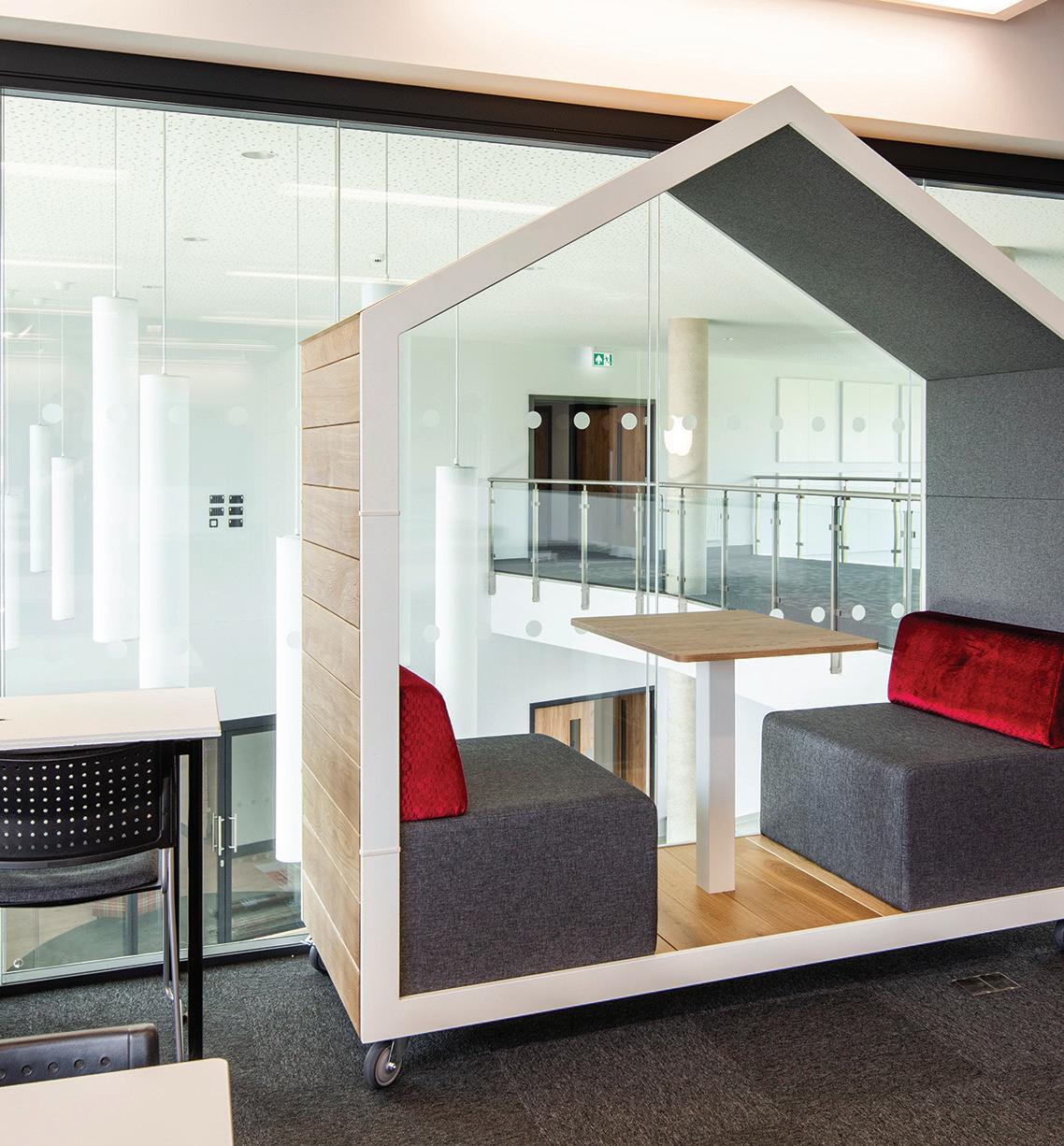
For Language, the Spoken Language presentation is assessed by the class teacher.
Teaching Methodology
Students can expect to take part in class discussions of texts, to prepare presentations, to work in groups as well as completing individual reading and writing tasks and essays. Drama-based activities support our study of texts as well as a whole range of speaking and listening activities. Students are encouraged to become confident and analytical readers who can effectively articulate their interpretations of texts both verbally and in formal writing. Students are encouraged to read a wide range of novels, poetry, plays, poems and non-fiction to support their study of English Language and English Literature GCSE.
Co-curricular and Enrichment
The English Department offers creative writing and reading clubs through the LRC, the successful Debating Society, a creative writing trip to the Arvon centre, and the opportunity to take part in drama performances. Theatre trips are offered to support literary study. There is also an English reading society.
Progression after GCSE
The two GCSE courses provide all students a solid grounding in fundamental reading and writing skills which are essential for accessing the entire curriculum. Those who wish to continue the study of Literature, may do so at A Level.
7
www.stdunstans.org.uk
Mathematics
Edexcel IGCSE 4MA1
Content
The IGCSE Mathematics course allows students to explore a wide range of concepts, from forming and solving quadratic equations to an introduction to calculus and set notation, whilst building on ideas for Years 7 and 8 through transformations, rearranging formulae and drawing straight line graphs. This is only a small sample of the topics covered in this extensive course. Students already began the IGCSE Mathematics course at the start of Year 9, with all of the topics covered between Year 9 and 11 forming the examinable content, but they will begin to find that new content is explored in increasing depth, with a focus on problem solving and combining their knowledge of previous topics.
There will also be the potential for some students in Year 11 set 1 to explore some additional topics beyond the IGCSE course with a view to taking an additional qualification - AQA Level 2 Further Maths. This will be particularly useful for those wishing to study Further Mathematics A Level, as it will act as a bridge between IGCSE and A Level and provide additional stretch and challenge in Year 11.
Assessment
Students are assessed regularly, usually towards the end of each half term. These marks are used to create the attainment scores across each year and for independent target setting and response from students. This is crucial in a subject that continues to build on previous knowledge to the extent that Mathematics does.
The final written examination consists of two papers and a scientific calculator is required for both. Each examination is two hours long. There is no coursework or controlled assessment for IGCSE Mathematics.
Teaching Methodology
Mathematics lessons often include some teacher explanations and examples, alongside a range of activities to practise the new concept for that lesson. This could include the use of matching tasks, mini whiteboards or formal written practice using textbooks and worksheets. It is essential that students develop their problem solving and written communication skills as they move towards their IGCSE examinations, so we include lots of practice of these elements across our lessons.
Dr Frost Maths is used for revision purposes and for some homework. Students have homework books, which will be used for further written practice.
graphs or constructions using rulers, compasses and protractors.
Co-curricular and Enrichment
All students in Year 10 are entered annually for the UKMT Intermediate Mathematics Challenge and there are opportunities for keen mathematicians to compete against other schools in the Hans Woyda team, which trains in Forder time in the Michaelmas Term. Year 10s are then able to attend Maths Challenge Club in Lent Term to prepare for another inter school team competition, the FMSP Maths Feast. Advanced Maths clubs run in Years 10 and 11 to introduce students to concepts beyond the curriculum and allow them to develop their mathematical communication skills. In Year 11, this club also delivers some of the content required for the AQA Further Maths Level 2 qualification, which is available for set 1 students to enter. Chess and Go club are also available, which assist with logical and strategic thinking.
Progression after IGCSE
The IGCSE course offers a strong foundation for students to progress to A Level Mathematics and Further Mathematics, both of which are linear courses, with no coursework elements. We offer the OCR (MEI) specification, which emphasises the practical use of mathematics to solve problems in industry.
These A Levels offer students an opportunity to explore mathematical concepts in far greater depth and build on their love of problem solving whilst exploring abstract concepts alongside their real-life applications. Hans Woyda club continues, along with additional mathematics lectures and advanced maths clubs to explore concepts beyond the scope of the course and prepare students for Mathematics courses at university.
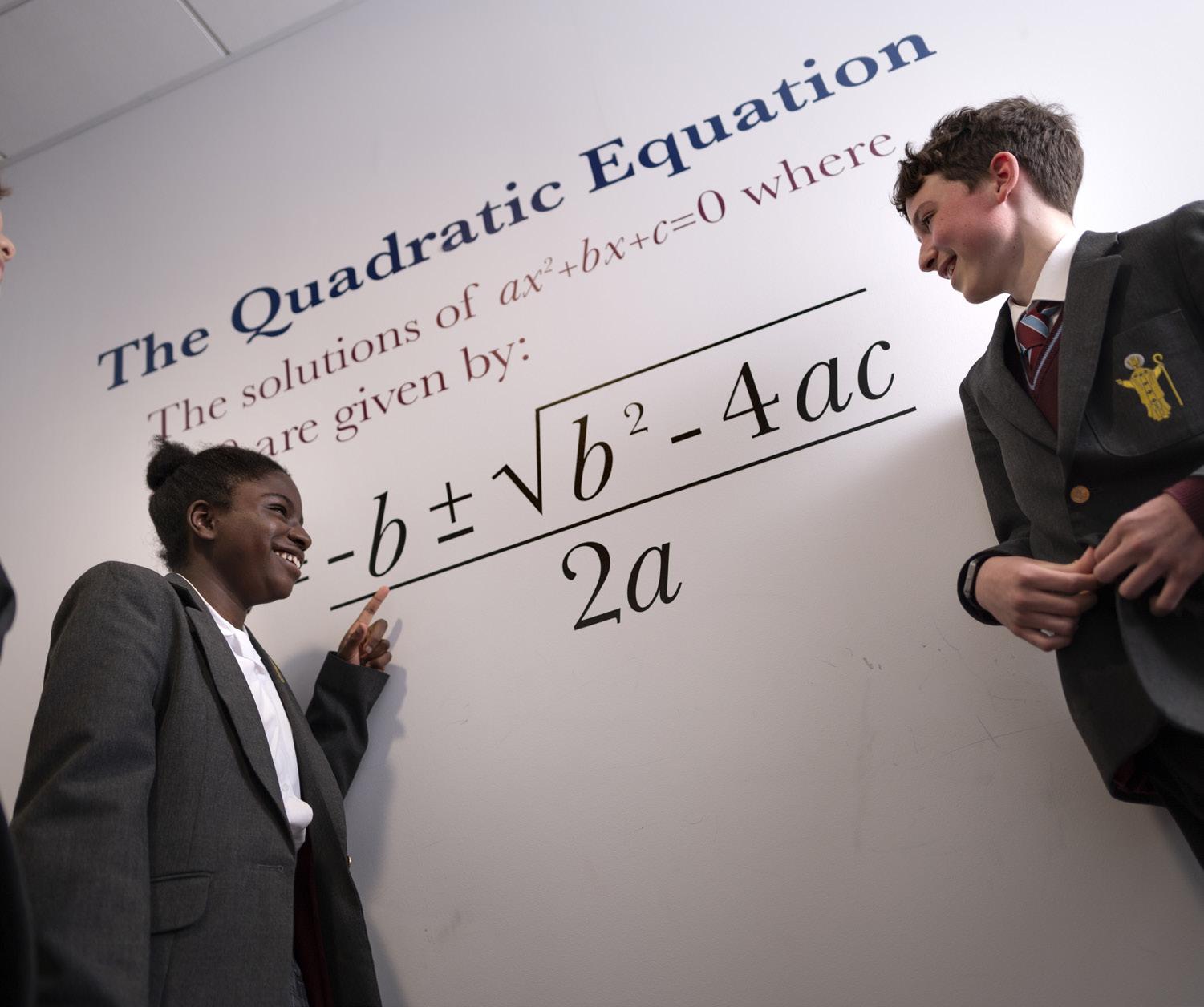
8 ST DUNSTAN’S COLLEGE I GCSE OPTIONS 2023
Sciences (Biology, Chemistry, Physics & Double Sciences)
Edexcel IGCSE
Biology: Edexcel IGCSE Biology (4BI1)
Chemistry: Edexcel IGCSE Chemistry (4CH1)
Physics: Edexcel IGCSE Physics (4PH1)
Double Science Edexcel IGCSE Double Science (4SD0)
Content
All students study a programme that covers the current National Curriculum for Science at Key Stage 4 and additional topics essential for progression to Sixth Form in Biology, Chemistry and Physics. Most students at St Dunstan’s College will take three separate Science IGCSEs – one each of Biology, Chemistry and Physics and some will study the Double Science pathway. Each pathway is an excellent preparation for those who wish to carry on and study the Sciences at A Level and beyond, but also provides a broad Science education for those who wish to study other subjects.
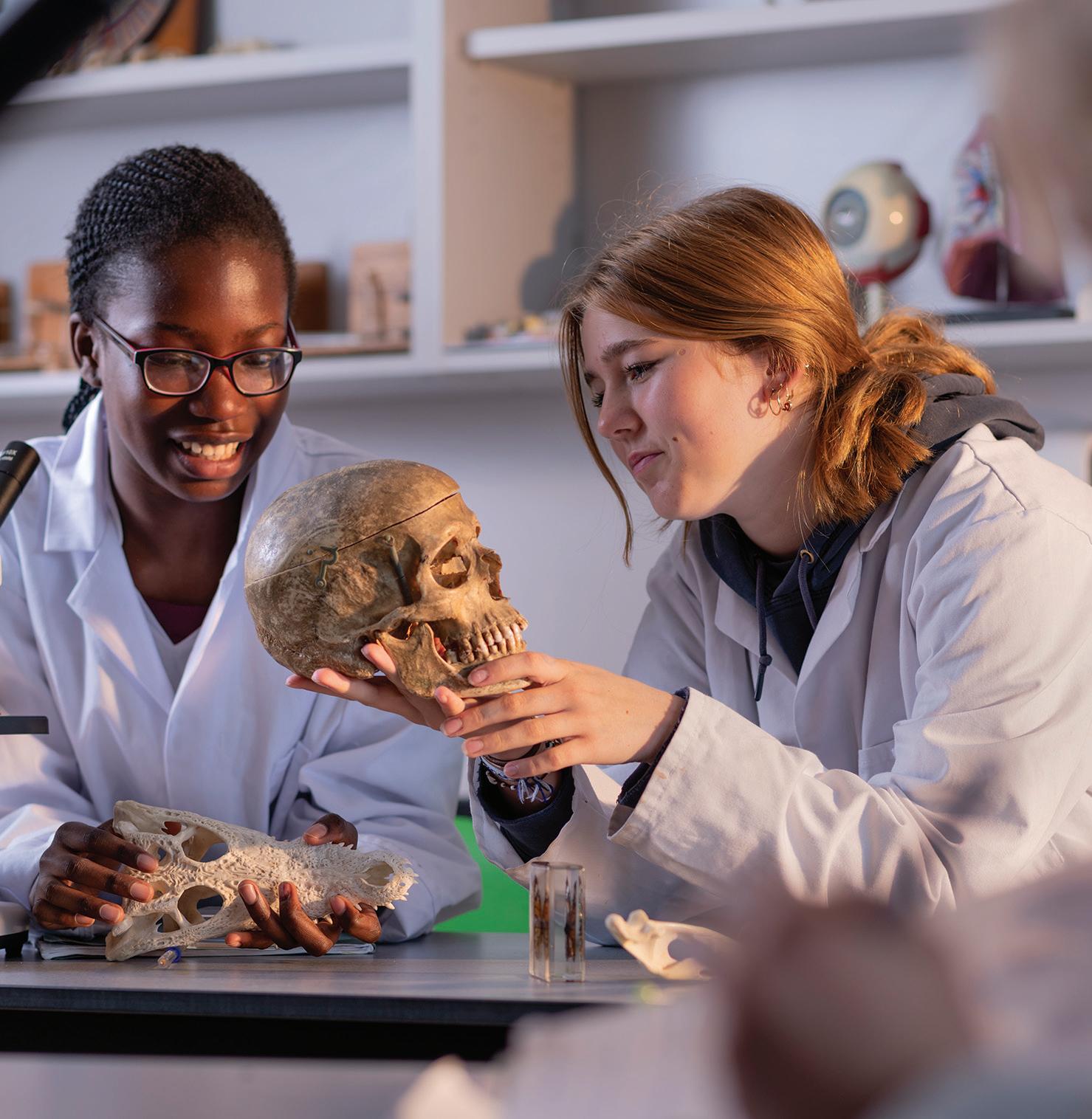
Assessment
For each of Biology, Chemistry and Physics: two papers per subject, one paper of 2 hours and one of paper of 1 hour and 15 minutes. This leads to three grades, one in each science.
For Double Science: one 2 hour paper per subject (Biology, Chemistry and Physics). This leads to two grades.
There is no controlled assessment or coursework.
Teaching Methodology
All students regardless of pathway study Biology, Physics and Chemistry separately, taught by subject specialists. Lessons have a strong focus on acquiring a strong understanding of the theory, before using this to carry out practical investigations which go above and beyond the Core Practical’s required by the exam board.
Co-curricular and Enrichment
In Science we always link theory to relevant topical issues. There is a range of enrichment activities that students are encouraged to participate in such as STEM Week which provides us with the ideal opportunity to explore science beyond the syllabus, and to make links across other curriculum areas. Students can take part in many competitions including
the UK Space Design Competition, Top of the Bench Chemistry competition, Astro Pi coding, British Physics Olympiad, and the First Lego League. During Forder time they can attend Ecology Club, MDV Soc, KS4 Science Club, KS4 Physics Masterclass, Physics and Maths Society, and Astronomy Society.
Progression after IGCSE
Students who study an A Level in Science often go on to study at Russell Groups Universities and Oxbridge. Students with a Biology A Level regularly go on to study Biological Sciences, Psychology or Healthcare related degrees such as Medicine, Veterinary Science or Pharmacy. Students with Chemistry A Level regularly go on to study Chemistry, Biochemistry, Medicine or Medicine related courses at university. Students with Physics A Level regularly go on to study Engineering at university, and A Level is recommended for entry for many degrees, notably including Economics and Computer Science. An A Level in any science if seen as well respected by universities and can open up a
9
www.stdunstans.org.uk
Languages
Modern Foreign Languages
Edexcel IGCSE
French: Edexcel IGCSE 4FR0
German: Edexcel IGCSE 4GM0
Spanish: Edexcel IGCSE 4SP0
Content
All four skills (Listening, Reading, Writing and Speaking) are assessed and final grades are determined by performance on a scale of 9-1. Topic areas:
• Home & Abroad
• Education & Employment
• Personal Life & Relationships
• The World Around Us
• Social Activities, Fitness & Health
Assessment
Paper 1: Listening paper (30 minute examination plus 5 minutes reading time): 25% of the total IGCSE
Paper 2: Reading and Writing paper (1 hour and 45 minutes): 50% of the total IGCSE
Paper 3: Speaking paper (maximum 10 minutes): 25% of the total IGCSE
Part A - discussion of a photo chosen by the candidate (falling under one of the core topic areas)
Part B - two further conversations on two of the other main topic areas
Teaching Methodology
Students enjoy the highly interactive and varied nature of language lessons, which focus on active involvement as a means to improving the four core skills of language learning. We make use of a wide range of source material beyond the GCSE Text Book in order to support and challenge students, including regular use of use audio recordings by native speakers. Students are encouraged to speak in the language as of¬ten as possible, whether via pair-work in class or during their weekly sessions with our Language Assistants. This is an opportunity for them to practise and improve their conversational skills with native speakers.
In addition to skills practice, mastering a language requires a disciplined approach to grammar and vocabulary learning to develop the ability to analyse and manipulate the key structures. Students will need to plan their written work thoughtfully, aiming to recycle language learned in class in order to consolidate their knowledge and demonstrate as wide a range of language as possible.
Through these approaches, our aim is for students to develop the ability to communicate effectively on a range of topics that are relevant to them, building on prior learning to increase the complexity and variety of their spoken and written language. The
ability to manipulate
and vocabulary is fundamental to this, but also enables students to access texts and other sources from a wide range of countries and communities where the language is spoken – as Federico Fellini said, “A different language is a different vision of life.” By acquiring a language at GCSE, students will be able to deepen their understanding of the culture of the language they have studied, whether this is when travelling abroad or by furthering their studies at A Level.
Co-curricular and Enrichment
The MFL Department recently took a trip to Paris for an immersive language-learning course, and hopes to run similar trips in the future, as students really enjoyed the mixture of cultural activities and language lessons. It is strongly recommended that GCSE students sign up early to these trips to make the most of them.
We also have a number of Forder clubs both to support students with their language learning and give them a taste of the cultures associated with the languages taught, spoken and celebrated at St Dunstan’s. These include a French Breakfast Club, Spanish Film Club, the Languages Ambassadors group, German Keep Warm for native speakers and even a Beginner’s Japanese club!
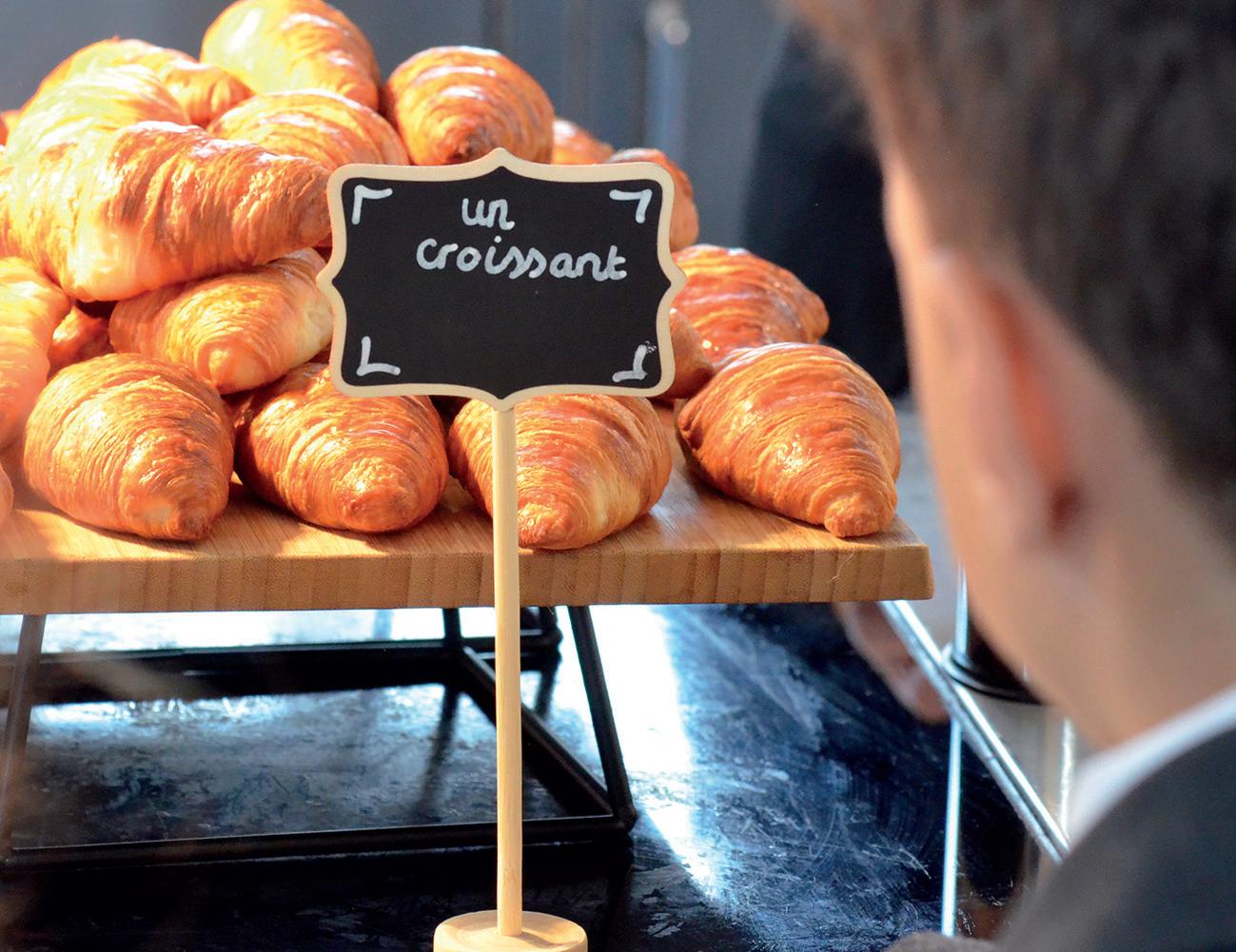
Progression after IGCSE
If you have enjoyed your language option and would like to progress to A Level, the IGCSE course is a solid foundation on which to build. The A Level course is has a much more cultural focus, and you will have the opportunity to learn about the music, film, literature and politics of the countries where the language is spoken. However, there remains a strong linguistic element to the course, with increased complexity of the vocabulary and grammar taught as a means to accessing a wider range of authentic material in the Target Language. With an A Level in another language you can apply to university to study the language, take up a second language ab initio at university, combine a language with another subject (e.g. Business) at university, communicate with people from other countries, work abroad, work for a company with international links, or simply have more fun on foreign holidays!
Language learning also gives you many transferable skills that are highly sought after by both universities and employers, greatly enhancing your prospects in any area of higher education or employment. These include communication skills, analytical skills and strong interpersonal skills through developing inter-cultural understanding.
10 ST DUNSTAN’S COLLEGE I GCSE OPTIONS 2023
grammatical structures
J282 OCR GCSE
Content
Latin GCSE offers students the opportunity to study the language and culture of one of the most remarkable and influential civilisations of the Ancient World. Students will read a variety of literature, both prose and poetry, whose subject matter is of universal interest, with the aims of developing precise analytical skills, a personal appreciation of the value of all language and literature and of the influence of Classical society on the modern world.
Assessment
There are three papers in the examination:
Language (01) externally assessed written paper, 100 marks, 1 hour 30 minutes – weighting 50%
The Language question paper has two sections.
Section A: Students will be required to answer comprehension questions, derivations and will choose between either answering questions on accidence and syntax or translating three short English sentences into the classical language. Section A is worth 30 marks.
Section B: Students will be required answer comprehension questions and translate a passage of unseen prose. Section B is worth 70 marks.
Prose Literature (03) externally assessed written paper, 50 marks, 1 hour - weighting 25%
Each question paper assesses a specific prose set text (110–120 lines). Students are required to answer comprehension questions, translate a section of the set text into English, answer questions focusing on literary style, characterisation, argument as appropriate to the set text studied and an extended response. Our prose authors for the examinations in 2025 and 2026 will be Tacitus and Pliny the Younger.
Verse Literature (04) externally assessed written paper, 50 marks, 1 hour – weighting 25%
Each question paper assesses a specific verse set text (110–120 lines). Students are required to answer comprehension questions, translate a section of the set text into English, answer questions focusing on literary style, characterisation, argument as appropriate to the set text studied and an extended response. The verse authors for the examinations in 2025 and 2026 will be Ovid and Catullus.
Teaching Methodology
Apart from the rich resources developed by the department, students use John Taylor’s comprehensive textbook, ‘Essential Latin for GCSE’ as well as Cullen and Taylor’s ‘Latin to GCSE’, which provide excellent means for developing the linguistic skills necessary to tackle the original Latin works encountered as the course progresses.
Co-curricular and Enrichment
Students may have the opportunity to attend a Classics Trip to sites of particular classical interest in Europe, such as Rome or Greece, which will directly assist in their understanding of the material they have studied. The department is planning a trip to Greece in October 2022. Students could also join clubs such as the Roman Poetry Club and as enrichment the Greek Language Club.
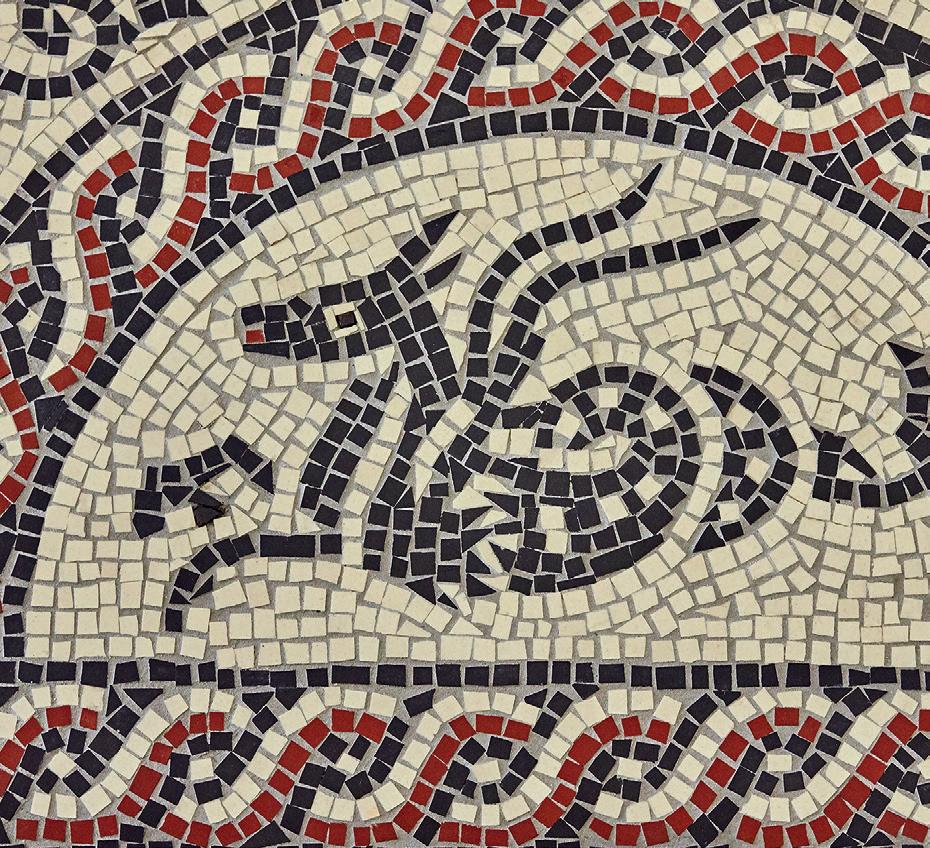
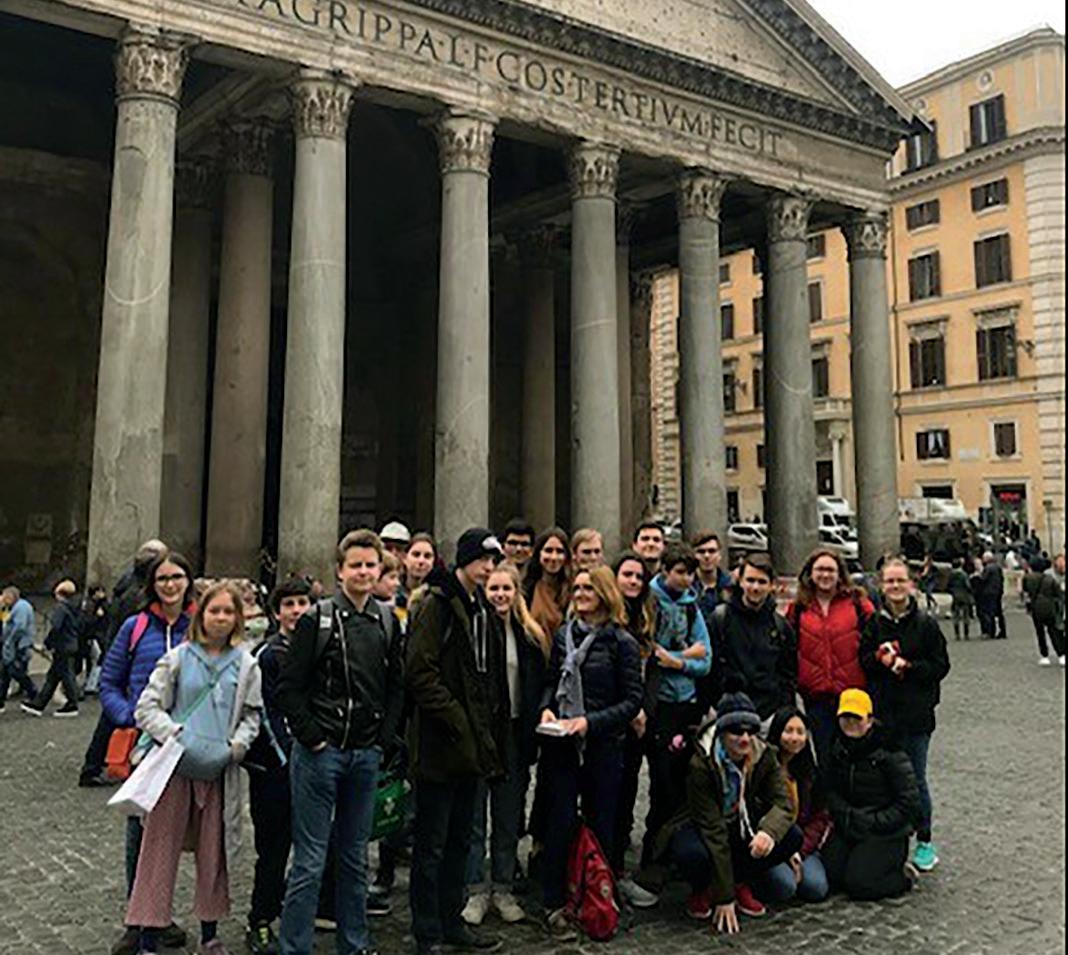
Progression after GCSE
Latin at GCSE is, of course, a prerequisite for any student considering the study of classical subjects and ancient history at Key Stage 5 (A Level) or beyond. However, it is also a vastly cross-curricular discipline which will be of benefit to students with a more general interest in humanities, languages or literature. It is valued by Higher Education institutions and employers as a result of the transferable skills in which it trains students, such as problem-solving, evaluation, linguistic fluency and versatility.
Latin 11 www.stdunstans.org.uk
Options subjects
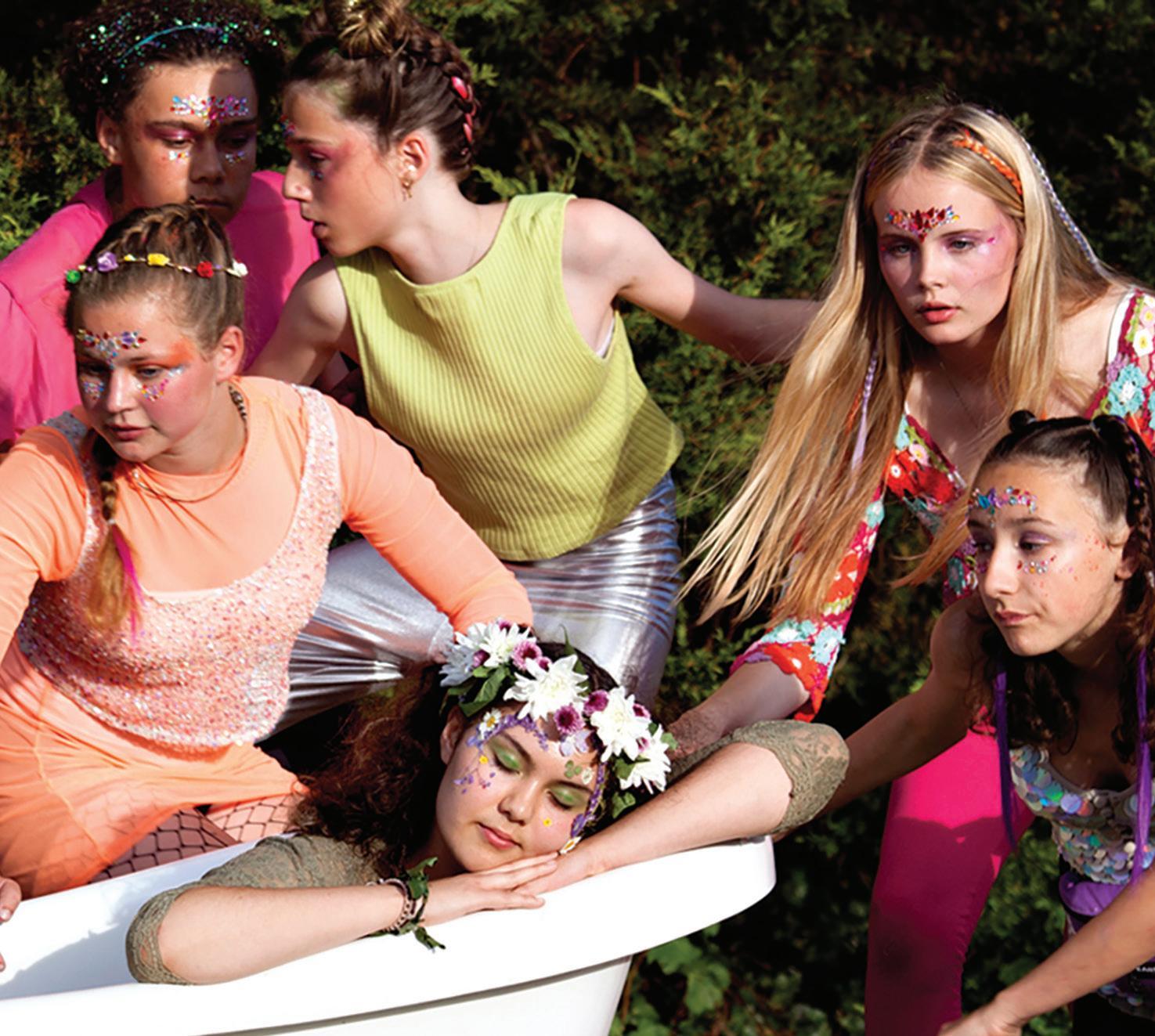
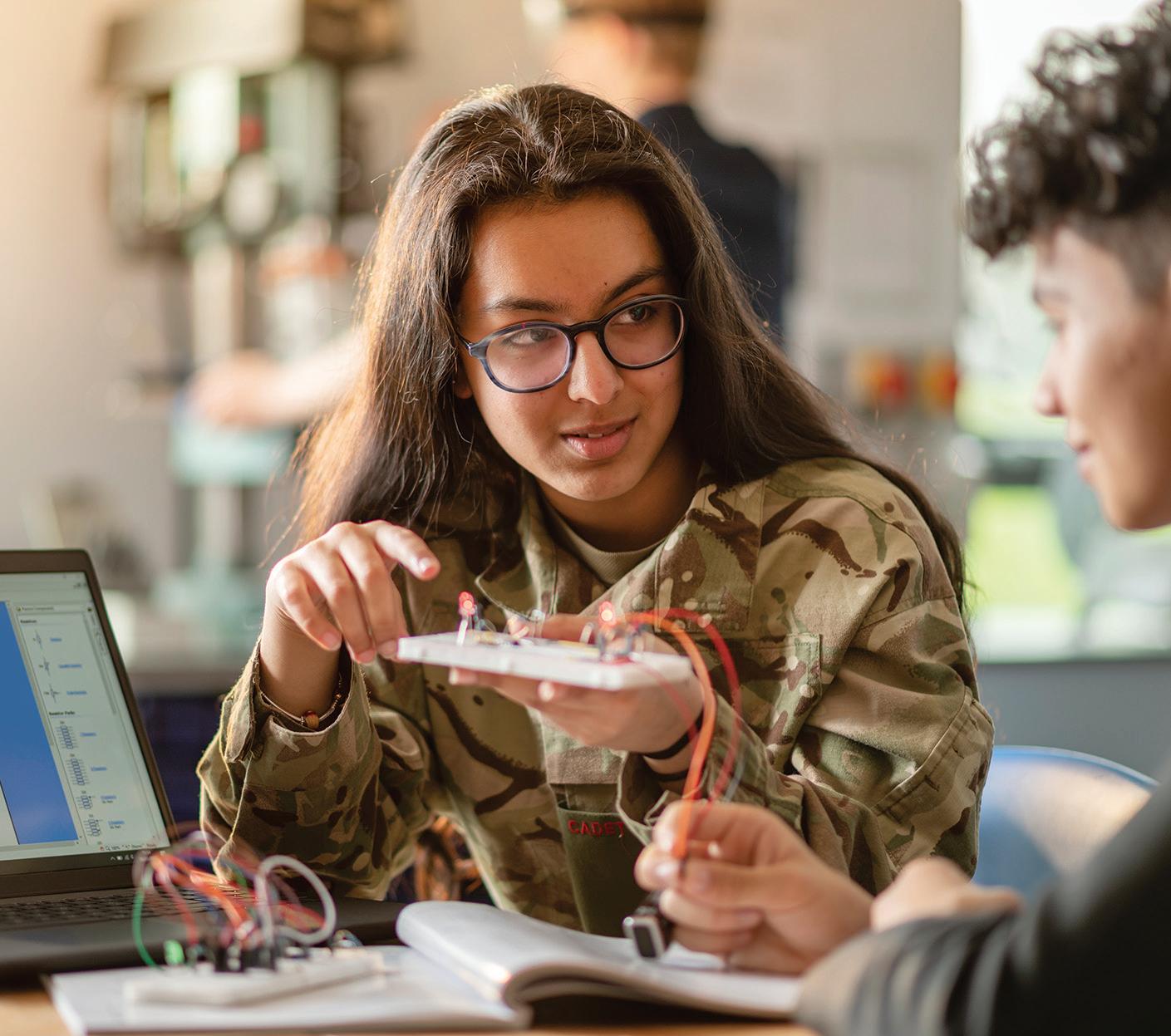
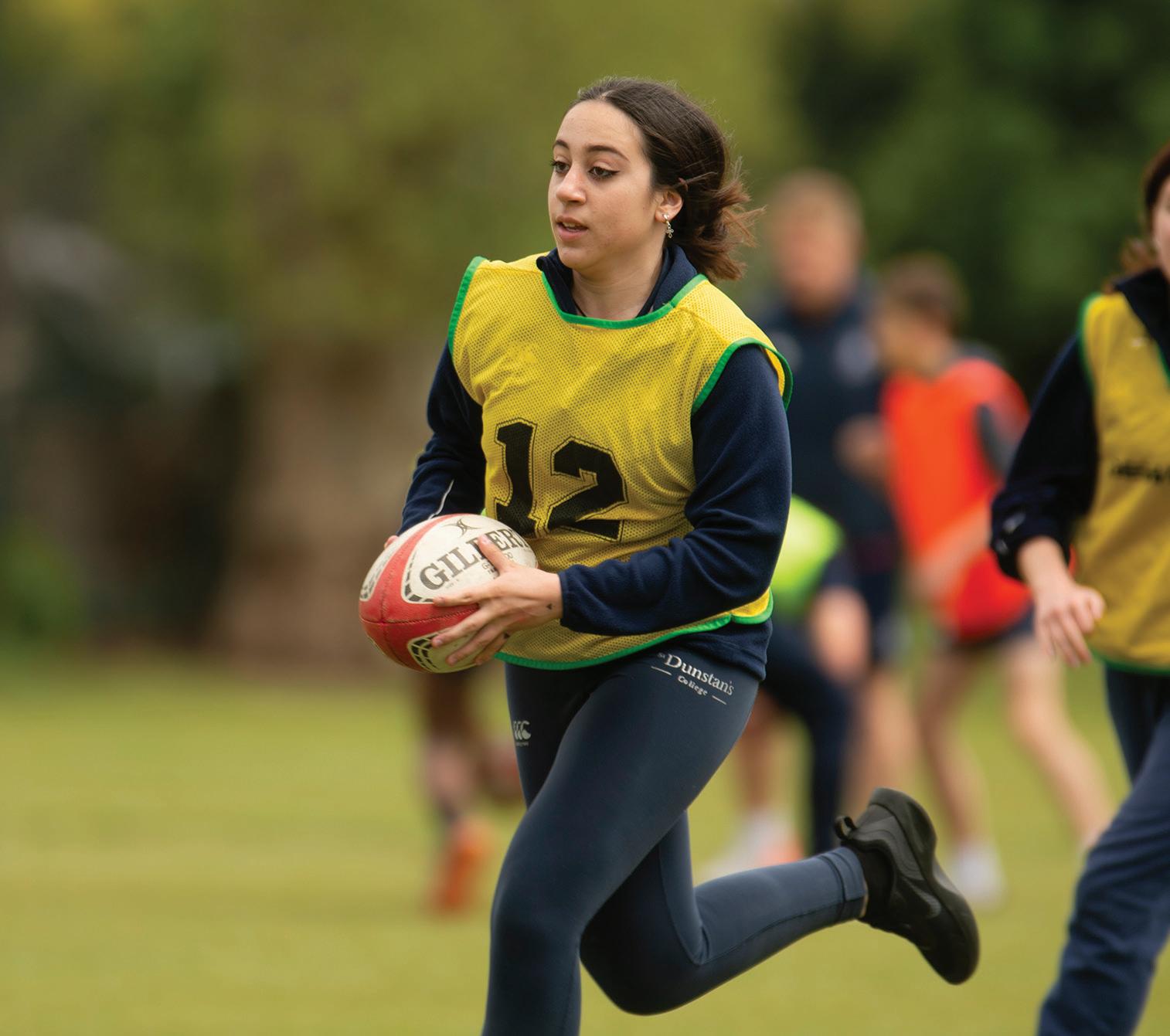
12
Art and Design
Edexcel GCSE Art, Craft and Design
Content
This is an innovative course, best suited to those who wish to channel their creative energies into producing original art pieces that reflect their individuality. It is about having an adventurous and enquiring approach to the visual world and cultivating the skills to respond to it. In Year 10, students work thematically on a variety of different ideas and media while in Year 11 they work more independently on their own ideas. Students will develop an understanding of past and contemporary Art and Design and will be able to produce personal responses embracing a range of concepts and techniques.
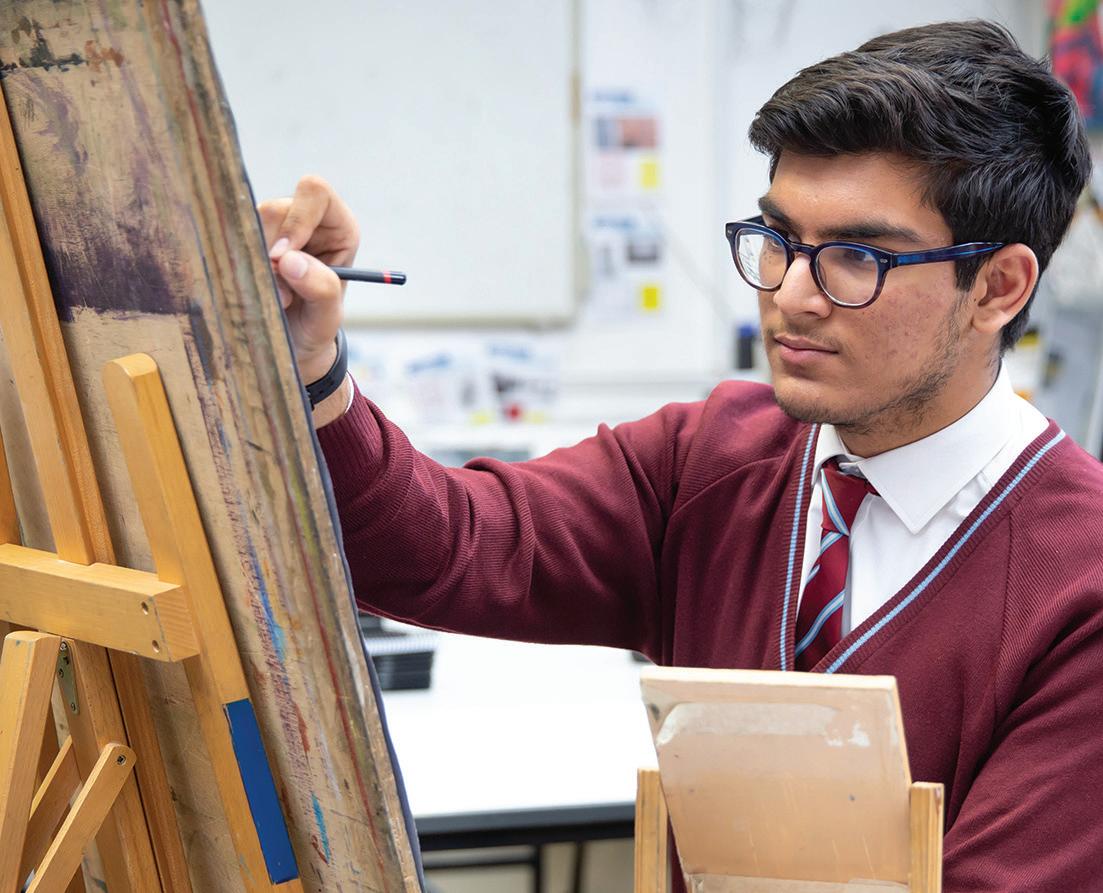
Work is unit-based using direct experience as a starting point. Students are given the opportunity to explore a wide variety of techniques and materials such as sculpture, painting, photography, digital manipulation, textiles and print.
A unit of work includes:
• An individual response to a theme.
• Making connections between your work and the work of artists.
• Creating using a range of materials and approaches.
• Developing an idea both in and out of the sketchbook.
• Creating a final piece.
Assessment
All work is internally assessed and marked and externally moderated. Each unit is assessed separately out of 72 marks using 4 assessment objectives of develop, review/experiment, record, present.
Unit 1-Personal Portfolio:
(60% weighting) Students’ portfolio work will consist of a body of research, supporting studies and developmental work leading to one or more outcomes. Submissions for each unit must contain a sketchbook.
Unit 2- Externally Set Assignment: (40% weighting) Students will be given an eight-week preparatory period for the controlled test where they will produce supporting studies both in and out of the sketchbook. During this period students may consult with staff and be supplied with guidance and materials. The timed element (10 hours set over a number of days) is an opportunity for the student to show how capable they are of carrying out in-depth work unaided.
Co-curricular and Enrichment
Students will visit museums and galleries across London on a regular basis. They will attend specialised workshops, artists visits, life drawing, and different talks or symposiums that relate to their current or future work. During the school week, specialised GCSE Forder clubs will allow students to receive extra studio working time and further contact with their teacher. Year 11 students will also benefit from having access to the art studios after school and during lunch.
Progression after GCSE
Studying GCSE Art and Design provides a fantastic opportunity to research and respond critically to the visual world, both culturally and historically, and in a personal and meaningful way. Many of these skills are valued and transferable across other subject areas. The course also equips students with an understanding and knowledge of art history and the ability to make their own informed judgements. Many students go on to study A Level and then to prestigious Art Foundation courses such as Central St Martins or Kingston University or to study Architecture and other design-based courses.
13
Business
Edexcel Business (1BS0)
Content
You’ll start by exploring the world of small businesses through the lens of an entrepreneur. How and why do business ideas come about? What makes a successful business? You’ll learn how to develop an idea, spot an opportunity and turn it into a successful business. You will understand how to make a business effective, manage money and see how the world around us affects small businesses and all the people involved.
Then you’ll move on to investigating business growth. How does a business develop beyond the start-up phase? You’ll learn about key business concepts and issues and decisions you need to make when growing a business and working in a global business. You’ll learn about meeting customer needs, making marketing, operational, financial and human resourcing decisions and you’ll explore how the wider world impacts the business as it grows.
Assessment
The qualification will be assessed in two equally weighted exam papers. There is no coursework.
Co-curricular and Enrichment
We have a lively Economics and Business Society which meets weekly to discuss contemporary debates in Economics and Business. Students also take part in our Investor Challenge which involves fantasy share dealing. Students will also visit local social enterprises and benefit from guest speakers from the world of business.
Progression after GCSE
Business at A Level is a popular option, and the Economics and Business department has enjoyed considerable success in A Level examinations and in preparing students to study Business-related courses at university.
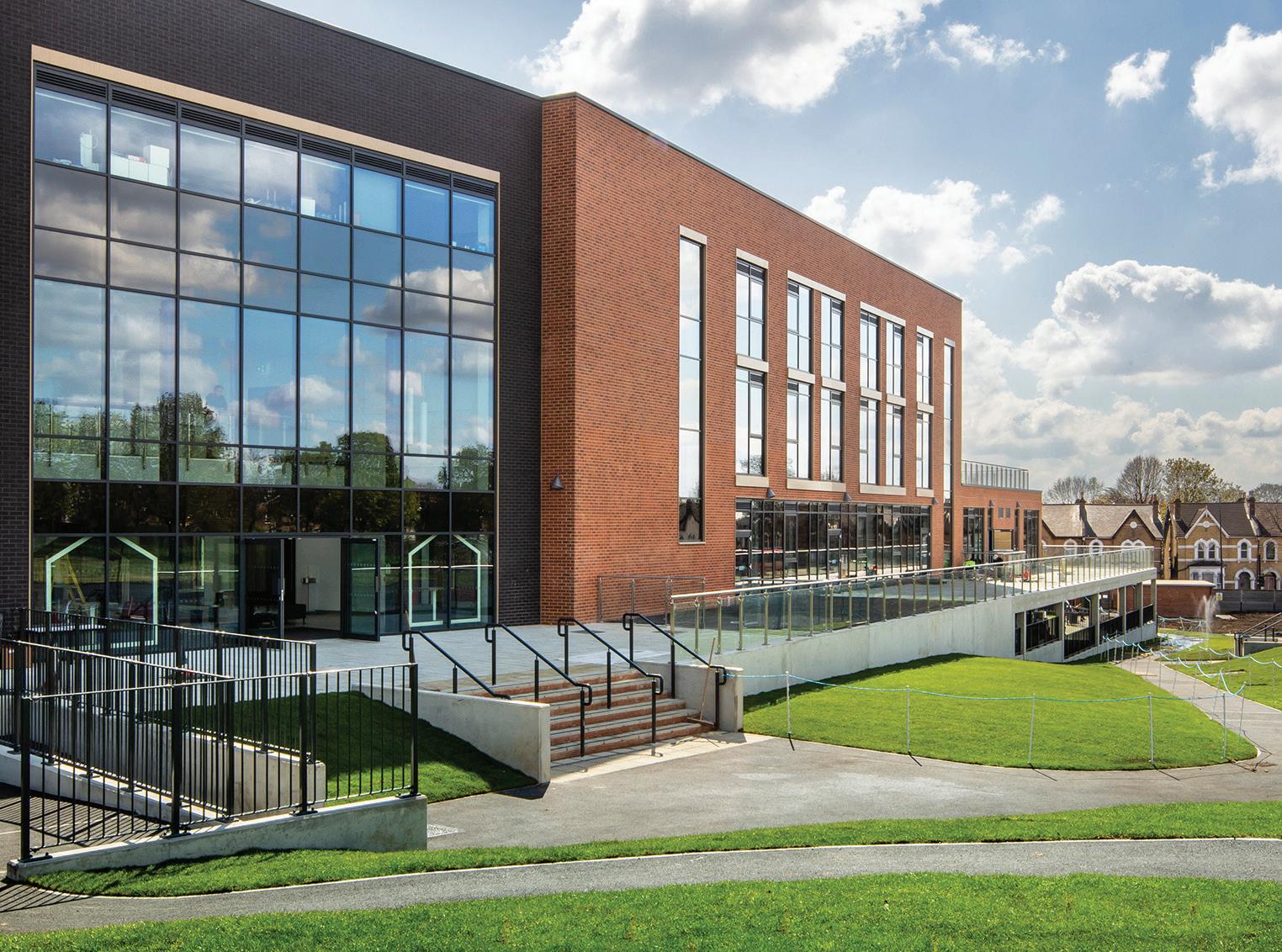
Multiple choice, calculation, short-answer and extended-writing questions. There are three sections in each paper.
Each section is ramped, starting with multiple choice questions, moving to short answer questions and ending with extended writing. Sections B and C are based on real life, relevant business contexts and examples.
14 ST DUNSTAN’S COLLEGE I GCSE OPTIONS 2023
Component Marks Weighting Time Format Paper 1 (Theme 1) Investigating small business 90 50% 105 minutes
Paper 2 (Theme 2) Building a business 90 50% 105 minutes
Classical Civilisation
OCR GCSE (J199)
Content
Classical Civilisation GCSE offers students the chance to explore a wide range of aspects of the Greek and Roman civilisations, including their daily life, entertainment, literature and history. Students will explore themes touched on in the Key Stage 3 Latin course, such as Roman burial customs and Greek Mythology, but will also encounter new topics, including the adventures of the Greek hero Odysseus, the labours of Hercules, the archaeology of Mycenae, Tiryns and Troy and will learn about life during the times of Achilles.
Classical Civilisation is an excellent option for anyone who enjoys learning about ancient Greeks and Romans, or new cultures generally, but does not want to continue to study the Latin language beyond Year 9. Classical Civilisation has no language component; all material is read in English. Students will study Greek and Roman art and architecture, literature and archaeological sources, underpinned by a purposewritten textbook and the vast range of resources available in the Classics subject area.
Assessment
There is no Controlled Assessment. All units are assessed by examination.
There are two components to the GCSE course, each worth 50% of the final grade:
Component Group 1:
Thematic Study - Myth and religion (11) This component involves a comparative study of ancient Greece and Rome, and combines literary and visual/material sources.
Component Group 2:
Literature and Culture - The Homeric world (21)
Students will read selections from Homer’s great epic, The Odyssey, telling the story of Odysseus’s travels back from the Trojan War and his encounters with numerous monsters, villains and gods along
the way. They will discuss what makes a good adventure story, a winning hero and a chilling monster!
This component contains two elements: one in-depth cultural study and one study of related literature.
Co-curricular and Enrichment
Students will have the opportunity to attend a Classics Trip to sites of particular classical interest in Europe, such as Rome and the Bay of Naples, which will directly assist in their understanding of the material they have studied. Students are also encouraged to join the Greek Language Club.
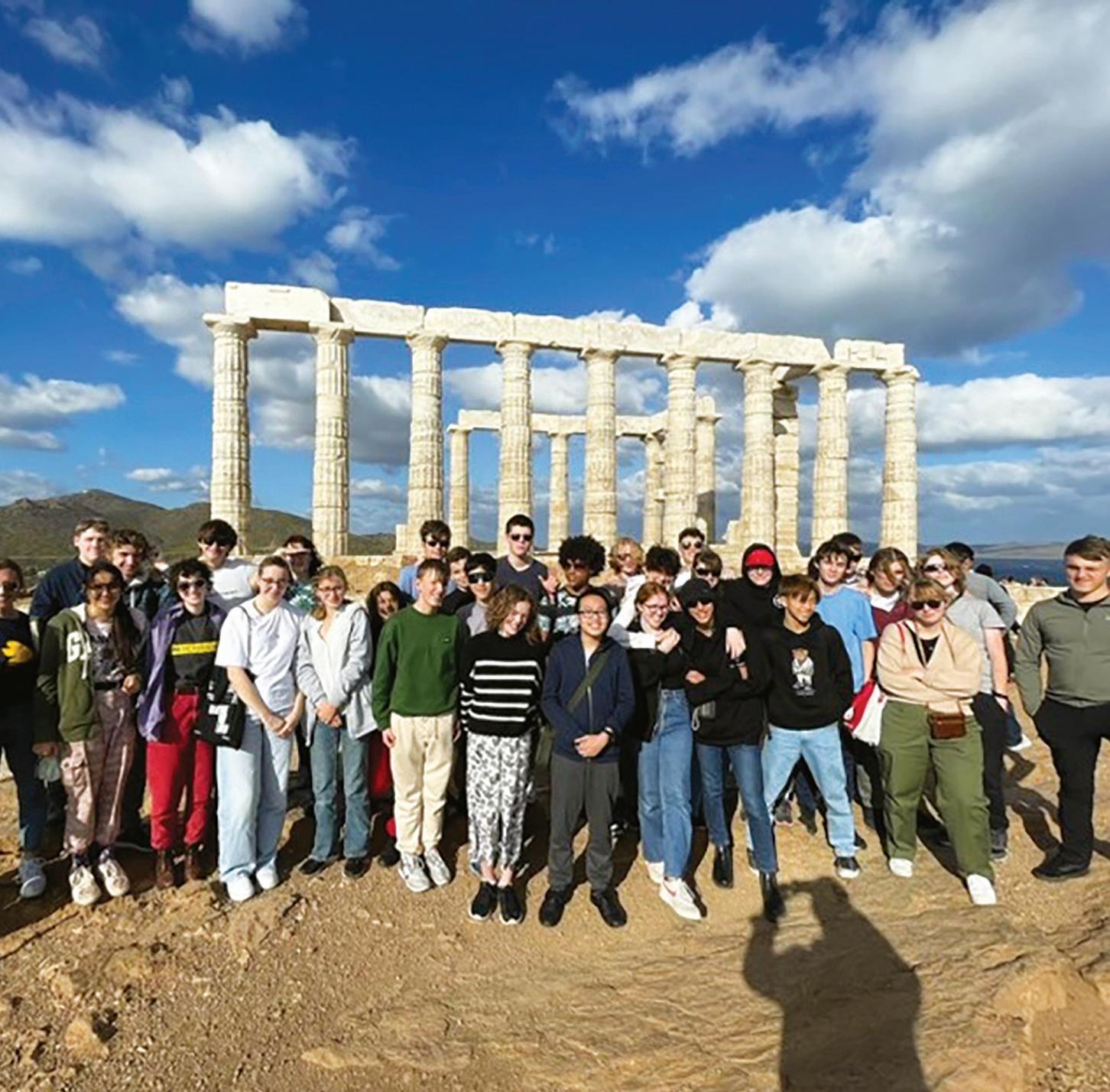
Progression after GCSE
Classical Civilisation GCSE ties in well with a broad range of subjects, due to its historical, sociological and literary elements and is of great benefit to students with a general interest in any of these areas. It provides an excellent opportunity to learn about new cultures and get a different perspective on modern beliefs and practices, and is valued amongst universities and employers for that reason.
15 www.stdunstans.org.uk
Computer Science
Computer Science (9-1)
Cambridge IGCSE 0984
Course Aims
In the rich, diverse, and digital world of today –Computer Science has immense value in preparing students for a future where the jobs of yesterday are quickly being automated and traditional roles begin to cease to exist. The course we run are exciting and give students the opportunity to explore a broad range of aspects of Computer Science, including Databases, Programming, Cybersecurity, Artificial Intelligence, and Digital Currencies. It enables students to develop and deepen their understanding of how to solve problems and build their independence in the classroom.
Content
The course will build upon foundational concepts taught through Years 7 to 9 and introduce students to fundamental Computer Science. The course is divided into two strands of knowledge: Theory and ProblemSolving.
• Theory will include the study of topics such as Boolean Logic, Hardware, Networks, Security, Number Systems, Data Representation, Software, Automation, Robotics, AI, Digital Currencies, and the Internet.
• Problem-solving builds on the student’s knowledge of textual programming languages such as Python and SQL whilst also deepening their understanding of Fundamental Algorithms, Databases, Boolean Logic, and Computational Thinking.
Assessment
Assessment is in the form of two examinations. Much of the content for Paper 1 will be covered in Year 10. Both exams are externally assessed. The final question in Paper 2 is a 15-mark unseen scenario question. Candidates will be required to write an algorithm using pseudocode or program code for the context provided.
• Paper 1 - Theory Fundamentals (1 hour and 45 minutes) 75 marks : 50%
• Paper 2 - Problem-solving & Programming (1 hour 45 minutes) 75 marks : 50%
Teaching Methodology
The course will be taught with a focus on deepening their problemsolving skills through numerous rigorous challenges with an emphasis on student independence and freedom. All lessons will be tailored to ensure exam preparedness with regular exam practice. Programming will be taught through the PRIMM methodology to guide students to a confident understanding. Opportunities for extension beyond the curriculum/syllabus will be always offered for students and tailored support will be provided for students that require extra support. The department operate an open-door policy and encourage all students to come and see us whenever they need/want to discuss their studies.
Co-curricular and Enrichment
As a department, we provide numerous opportunities for students to further their understanding beyond the curriculum. We organised trips throughout the course including Bletchley Park, the Science Museum, and the National Museum of Computing History. We regularly seek out external speakers to bring their knowledge to the students for their benefit. We also operate multiple, successful clubs within the department including eSports Club, Content Creators Club, and Code Analysis Club. We also work with students who come to us with interesting ideas and aim to support them in their individual projects, should they ever wish to undertake one. We also provide personal support for students looking for information about universities, courses, or extra reading material.
Progression after IGCSE
We also offer students a robust, challenging A Level course for those wishing to undertake further study. Students who undertake this often go on to study at Russell Group universities and Oxbridge, choosing Computer Science, Engineering, Mathematics, or Philosophy courses. An A Level
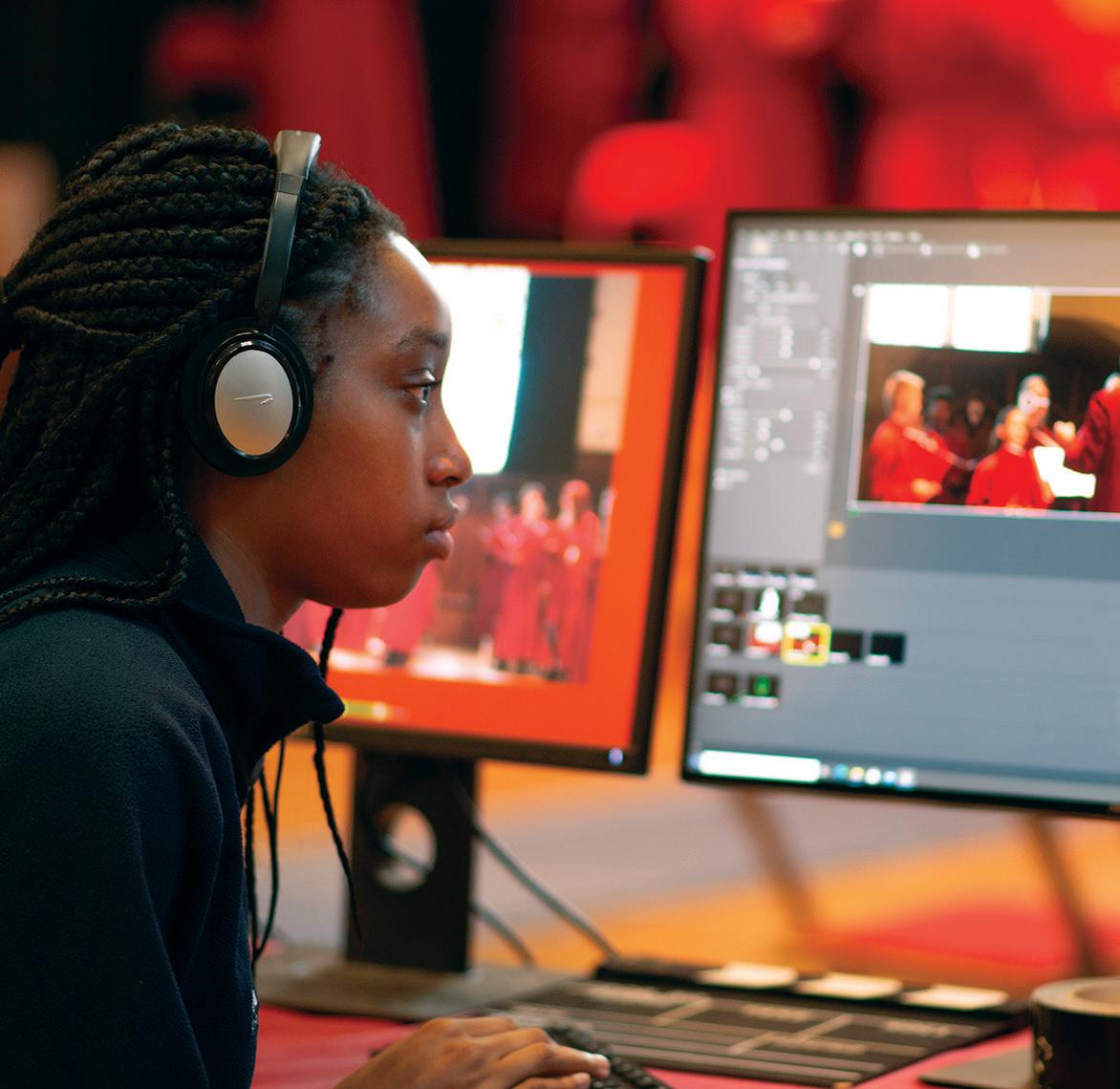
16 ST DUNSTAN’S COLLEGE I GCSE OPTIONS 2023
Design Engineering
AQA GCSE Engineering Content
The sky’s the limit. Engineering is an increasingly innovative and exciting area to work in. It affects every aspect of modern life – from skyscrapers to smart phones, cars to carrier bags.
Our new GCSE introduces students to a host of new technologies, helping them to gain practical skills and understanding to inspire a lifelong interest in engineering. It will particularly appeal to those who enjoy being creative, with an affinity for drawing, design, maths and problemsolving.
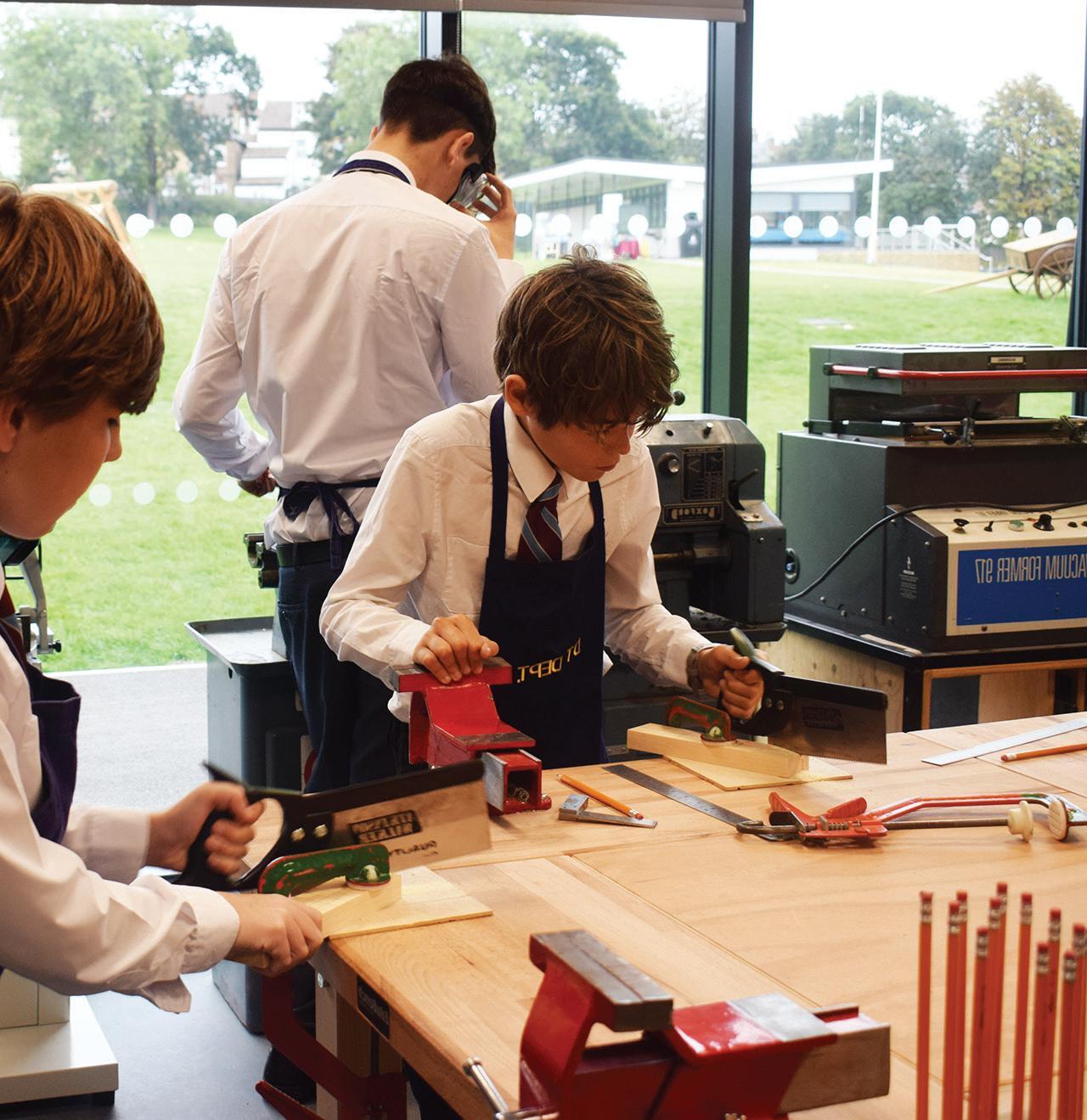
Core content
1. Engineering materials
2. Engineering manufacturing processes
3. Systems
4. Testing and investigation
5. The impact of modern technologies
6. Practical engineering skills
Assessment
Written exam: 2 hours - 120 marks - 60% of GCSE
Coursework: A brief set by AQA released on 1 June in the first year of study. - 80 marks - 40% of GCSE
Teaching Methodology
Theory lessons form an integral part of the course, but the majority of the students’ class time is allocated to coursework tasks, including design folio production and practical work. Students should therefore understand that they need to develop an independent and self-disciplined approach to research work and study outside the classroom.
In Year 10 students will be completing several projects to teach them the Engineering theory as well as learn practical skills. Year 11 will be predominantly completing the coursework. A high standard of presentation and a range of graphic techniques including good quality, freehand sketching, use of computer-aided design software and desktop publishing will
be needed to produce design folios and other coursework. Students should already have a firm basis of these skills to be developed further during the GCSE course. High quality, computer-aided design (CAD) software is provided for students wishing to install this on a PC at home.
Co-curricular and Enrichment
As a department we always ensure that subject content is relatable and focus’ on Engineering in the real world. We also run multiple co-curricular clubs that students can attend. Arduino coding club gives students an opportunity to design and develop their own coding projects. We also run several trips and visits throughout the GCSE course.
Progression after GCSE
The study of Engineering provides students with the opportunity to develop a wide range of research, analytical, creative, evaluative and IT skills; many of which readily ‘transfer’ to other disciplines. Engineering provides a foundation for future study in a huge range of design related subjects and helps equip students with the ability to become more discerning consumers in a world where almost all they see and touch has been designed.
17
www.stdunstans.org.uk
Drama and Theatre Studies
GCSE (WJEC EDUQAS)
Content
WJEC Eduqas GCSE in Drama offers a broad and coherent course of study enabling students to:
• Apply knowledge and understanding when making, performing and responding to drama
• Explore performance texts, understanding their social, cultural and historical context including the theatrical conventions of the period in which they were created
• Develop a range of theatrical skills and apply them to create performances
• Work collaboratively to generate, develop and communicate ideas
• Develop as creative, effective, independent and reflective learners able to make informed choices in process and performance
• Contribute as an individual to a theatrical performance
• Reflect on and evaluate their own work and that of others
• Develop an awareness and understanding of the roles and processes undertaken in contemporary professional theatre practice
• Adopt safe working practices
Assessment
Component 1: Devising Theatre
Non-exam assessment: internally assessed, externally moderated (40% of qualification) Students will be assessed on either acting or design.
Students participate in the creation, development and performance of a piece of devised theatre using either the techniques of an influential theatre practitioner or a genre, in response to a stimulus set by WJEC. Students must produce: a realisation of their piece of devised theatre supporting evidence an evaluation of the final performance or design.
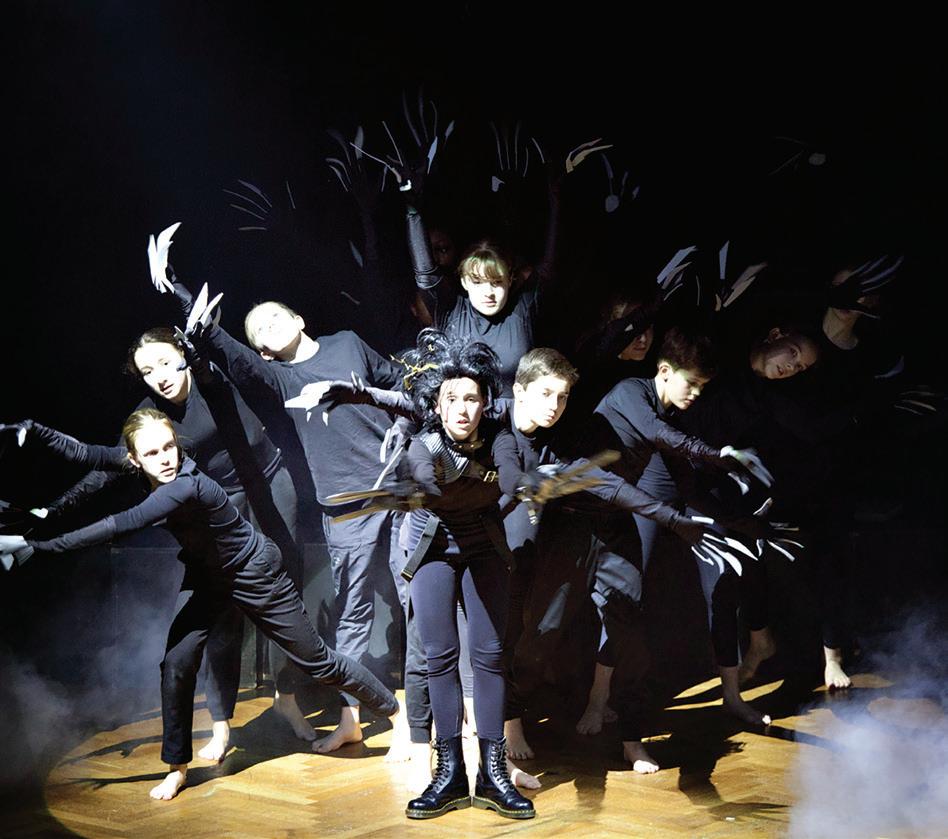
Component 2: Performing from a Text
Non - exam assessment: externally assessed by a visiting examiner (20% of qualification)
Students will be assessed on either acting or design. Students study two extracts from the same performance text chosen by the centre. Students participate in one performance using sections of text from both extracts.
Component 3: Interpreting Theatre
Written examination: 1 hour 30 minutes 40% of qualification
Section A: Set Text
A series of questions on one set text from a choice of five:
1. Macbeth - William Shakespeare
2. An Inspector Calls - JB Priestley
3. Find Me - Olwen Wymark
4. Noughts & Crosses - Malorie Blackman
5. Refugee Boy - Benjamin Zephaniah
6. I Love You Mum - I Promise I Won’t Die Mark Wheeller
7. The IT - Vivienne Franzmann
Teaching Methodology
The course is comprised of both written and practical components, as noted within the assessment section above. The performance elements of the course focus on skill acquisition and their application within differing performance styles. The written course is focused upon analysis and evaluation of both literary play texts and the student’s own performances.
Co-curricular and Enrichment
The co-curricular offering at the College is both wide and varied in terms of Drama Productions. As well as remaining highly inclusive for all, we offer students the opportunity to try their hand within a range of styles, including, but not limited to, Naturalism, Brecht, Musical Theatre, Physical Theatre and Artaud. With a focus on diversity and the use of ensemble, we encourage all students to create artistic intentions that relate to both the College Values and the context of the world in which they live. Where possible, we also seek to create altruistic productions that often devised in conjunction with a charity chosen by the ensemble and linked to the main themes of the work. Alongside productions, we visit the theatre often, with students paying for relevant, compulsory theatre visits during the course. Tickets prices vary but usually cost between £12.00 and £25.00 depending on the mode of transport to and from the theatre involved.
Progression after GCSE
The study of Drama and Theatre at A Level opens the door to a multitude of opportunities for students, as they begin considering their future career path. For those who are keen to progress into the professional world of performance, we have strong track record of students attending elite training facilities such as RADA and Central School of Speech and Drama, studying not only Acting, but also Dance, Technical Design and Script Writing. For those favouring a more traditional route, many students continue their study in a plethora of red-brick universities such as Warwick or Durham, majoring in specific aspects of theatre such as speech therapy and youth counselling, or combine it as a minor alongside subjects such as English Literature or RPE.
18 ST DUNSTAN’S COLLEGE I GCSE OPTIONS 2023
Geography
Edexcel 4GEO
Content
Geography aims to bring together the wide range of ideas that shape the world we live in, and explain how we can adapt and work with them. Geographers are able to combine skills: analysis, data interpretation and fieldwork, combined with the ability to explain your ideas and evaluate them for an audience. As a contemporary subject, you’ll study the world around you and the forces that shape it: using real world examples, current events and clear case studies to deepen and strengthen your understanding.
Assessment
The IGCSE is assessed in two separate papers, with no controlled assessment.
Paper 1: Physical Geography (4GEO/01) 40%
Coastal environments Hazardous environments Fieldwork to investigate these topics
Paper 2: Human Geography (4GEO/02) 60%
Economic activity and energy Urban environments Globalisation and migration Fieldwork to investigate these topics
Full information and typical content can be found on the Edexcel iGCSE specification
Teaching Methodology
Taught by expert teachers, we have examiners and subject experts to get you the best results we can. We expect high standards, and we will keep pushing you to constantly challenge your world view – through fieldwork, travel, and an exciting curriculum that keeps you involved in explaining the events you experience. Be prepared for a great journey.

Co-curricular and Enrichment
The new IGCSE specifications gives you the best Geography that we can. We are bringing in new skills – like GIS, and online mapping; getting the best out of interactive and case study driven lessons, and making use of our position in the heart of London to be in contact with universities and researchers alike. You’ll be part of the Senior Geography Society, meeting and hearing from excellent speakers from academic and business worlds. You’ll be able to join some of the Senior Geography adventures, building on Iceland, and future destinations will reflect the demands and inspiration for our Geography students!
We expect to conduct a variety of local fieldwork through the duration of your IGCSE course, which helps in key parts of the examination, but does not need to be written up formally. This is a significant change to previous Geography courses – we think it’s a major advantage! Trips will be small scale, local and help build real depth and understanding: without costing the Earth.
Progression after GCSE
Geography opens up a world of options. You’ll find that your skills will take you a long way: Geography goes well with Arts and Sciences alike, and is academically rigorous to provide excellent support for almost any combination, as well as being a rich academic subject to lead your studies. We have an excellent track record of Geographers at university, including Oxford success, and of achieving great results at A Level and beyond. So, why not take the first step?
History
Cambridge IGCSE (0977)
Content
The Cambridge IGCSE is a modern History course that enables students to explore key issues that have shaped the contemporary world. The core content of Paper 1 is “the twentieth century: international relations since 1919” and is examined through the following key questions:
1. Were the peace treaties of 1919–23 fair?
2. Why had international peace collapsed by 1939?
3. Who was to blame for the Cold War?
4. How effectively did the United States contain the spread of Communism?
Students also undertake a depth study on Germany 1918-1945, which examines the creation and failure of democracy in Germany after the First World War, the Rise of the Nazi Regime, and its effect on German Society.
Paper 2 is a source-based paper, the topic of which changes annually. For the 2025 examination the topic is “To what extent is the League of Nations a success?” Students will examine a range of perspectives on developments in the region, giving a broad appreciation of this important period of the recent past.
Assessment
Paper 1 – 2 hours, 60 marks. 40% 2 hour exam, candidates answer 2 questions on the core content and 1 on the depth study.
Students are assessed on their ability to describe, explain, and evaluate historical events.
Paper 2 – 2 hours, 50 marks 33% Students are assessed on their ability to analyse and evaluate historical sources
Non-examination Assessment – coursework: 40 marks 27% Students write a 2,000 word essay related to the depth study, Germany 1918-1945.
Teaching Methodology
Taught by subject experts, lessons place a strong emphasis on discussion to develop the higher-level skills of evaluation while grounding such debate in a firm grasp of the fundamental historical evidence. Although source skills are only examined in Paper 2, we ensure that the teaching of source skills is embedded throughout the course allowing students to become comfortable handling a range of written and visual source types.
Co-curricular and Enrichment
There is a Middle School History Society for students to explore issues related to the course as well as giving the opportunity to develop their broader historical interests. Local trips will be planned for the Holocaust exhibit at the IWM and an international trip to Berlin is planned for the summer of 2024.
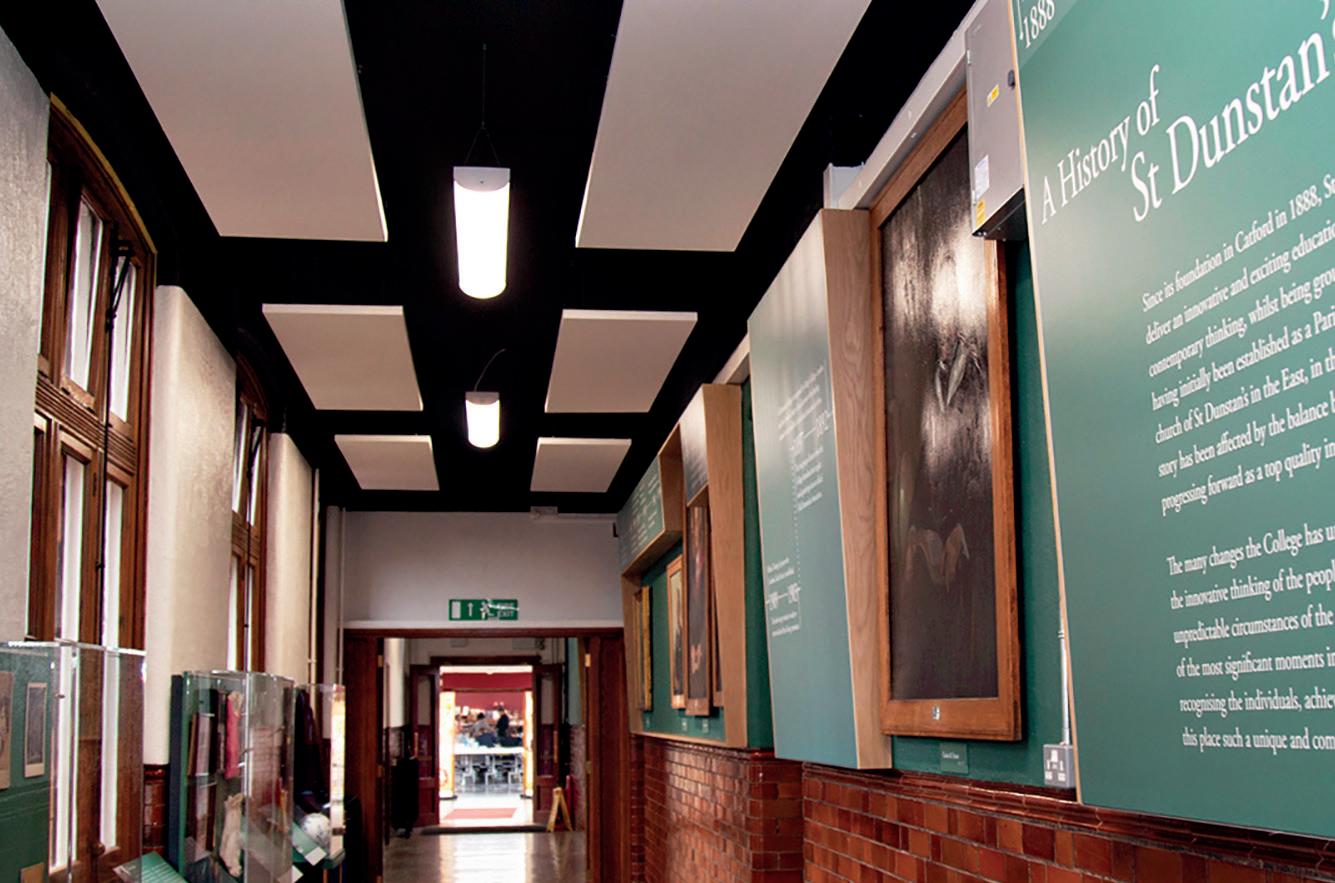
Progression after IGCSE
History equips students with a toolkit of transferable skills in analysis, evaluation and communication that are beneficial for both the humanities and sciences. History at A Level is a popular option and retains a modern focus while reintroducing some medieval history. The History department has enjoyed considerable success in A Level examinations and in preparing students to study History, including as part of a joint honours course, at top universities including Oxford and Cambridge.
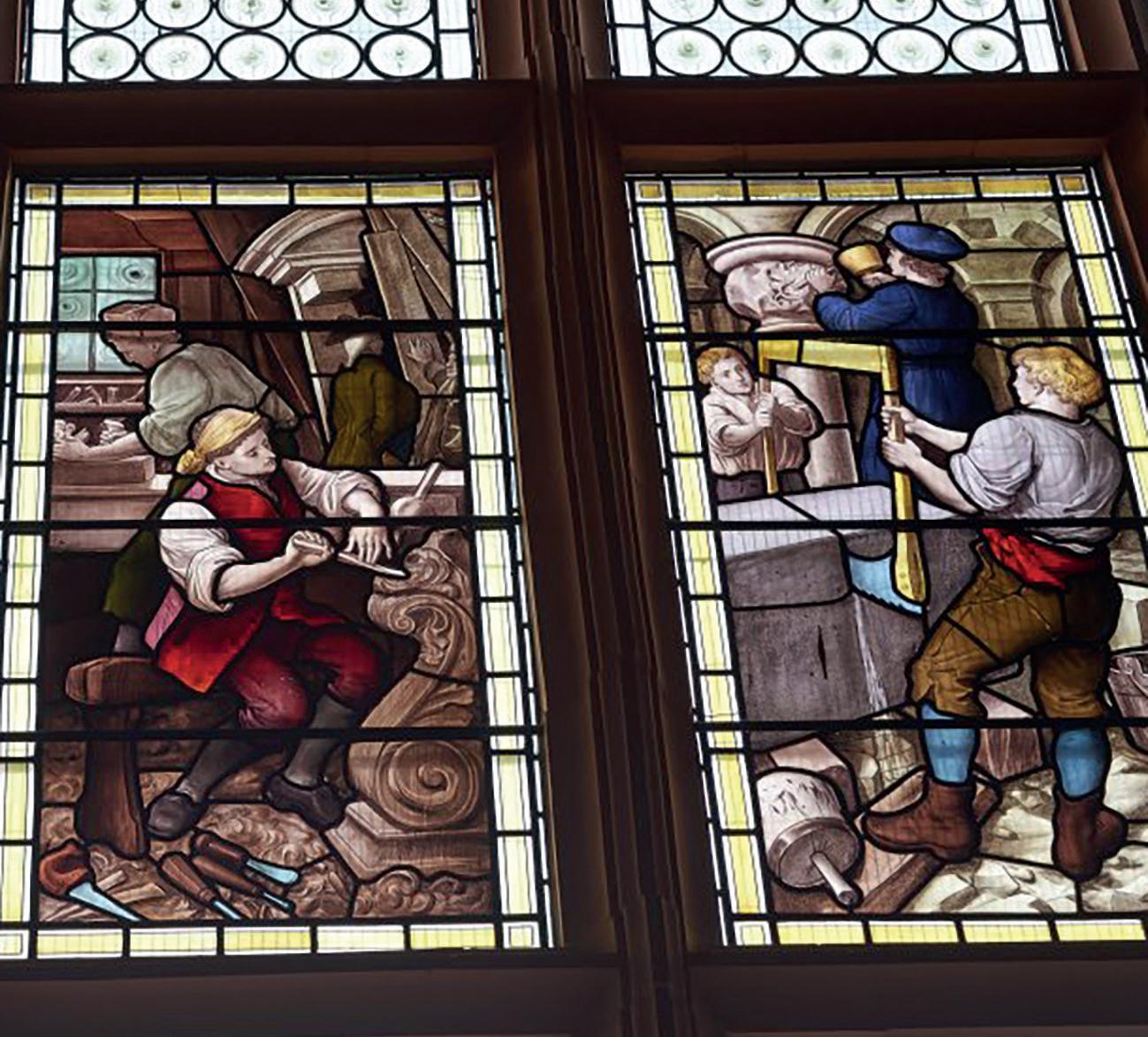
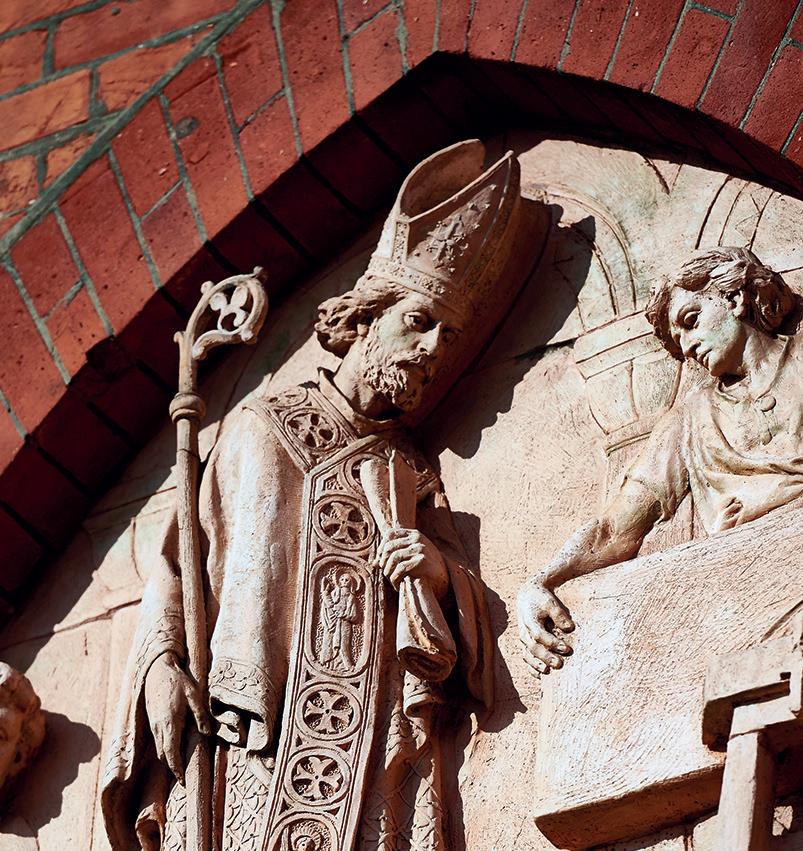
20 ST DUNSTAN’S COLLEGE I GCSE OPTIONS 2023
OCR - J536
Content
Music is everywhere. It’s an integral part of modern life. We are exposed daily to a huge range of musical styles and cultures all of which have the power to affect us deeply as humans. OCR GCSE Music is an exciting and diverse qualification that offers students the ability to analyse what they hear, create developed compositions, as well as developing their performing capabilities on their chosen instrument or in music production. This is achieved through focus on 5 areas of study:
1. My Music (study of own instrument or music production)
2. The Concerto Through Time
3. Rhythms of the World
4. Film and Video Game Music
5. Conventions of Pop
Assessment
Integrated Portfolio (30%): Coursework - Solo performance or production (15%) and a free composition in a style chosen by the candidate (15%)
Practical Component (30%): Coursework - an ensemble performance or production (15%) and a composition of a piece of music in response to a set brief in relation to one of the areas of study (15%)
Listening and Appraising (40%): Examination 30 minutes. Questions are based on students’ learning throughout the course on areas of study 2-5. Pupils respond to unprepared listening extracts, identifying their musical elements and contexts, through a set of short and medium-form questions. There are no essays to complete at GCSE.
Teaching Methodology
The GCSE Music classroom is a vibrant, dynamic and fun environment. Lessons usually feature a balance of all three of the main aspects of the course. Practical work forms a significant component and students are expected to practise regularly on their instrument. Noteflight, Soundtrap and Logic Pro software are available to students for their compositions.
Any student that can demonstrate a commitment to their chosen performance discipline and composition can excel at GCSE Music. It is recommended that students are currently having, or beginning, private lessons in their instrument. Pupils performing at the equivalent of grade 3 standard in Year 11 are able to access the highest marks as part of their performance coursework. Producers that have enjoyed the ‘Arranging a Hit’ Year 9 module can also develop these skills as part of the course, through specialising in the production pathway. Students will have access to our exciting facilities, including a new recording studio, Mac suite and three multi-purpose classrooms, including a recital room.
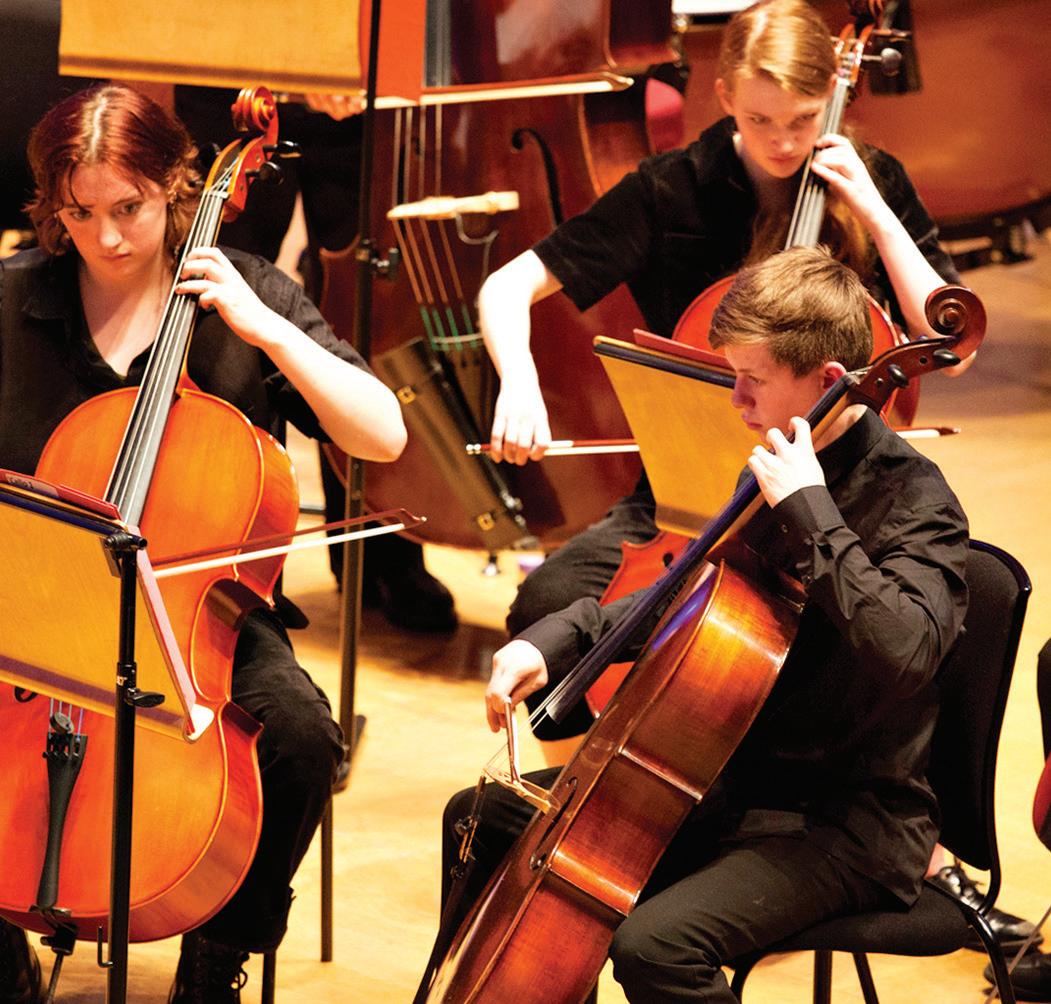
Co-curricular and Enrichment
There is a wealth of opportunities for students to perform both formally and informally throughout the course and to present their creative work to a wider audience. GCSE students should play an active role in the life of the Music Department, attending groups or workshops regularly as part of the Forder programme. Termly trips are arranged to concerts, gigs and performance workshops in London to hear and perform music, related to the areas of study.
Progression after GCSE
Pupils will develop and enhance their creativity, critical listening, performance skills, confidence, resilience, interpretation of multifaceted data, team-work and technological capabilities through the course. These far-ranging skills are essential to any A Level or career, as well as preparing them for possible careers in the creative arts industries.
Music 23 www.stdunstans.org.uk
Physical Education
OCR – J587
Content
Component 01: Physical factors affecting performance
Students explore how parts of the human body function during physical activity and the physiological adaptations that can occur due to diet and training. They also develop skills in data analysis, and an understanding of the principles of training, why we train in different ways and how training plans can be made to optimise results. There are two topics:
• Applied Anatomy and Physiology
• Physical Training.
Component 02: Socio-cultural issues and sports psychology
Students develop their knowledge of the social-cultural and psychological influences on levels of participation in sport, and also how sport impacts on society more broadly. This includes the individual benefits to health, fitness and well-being of participating in physical activity, as well as the influences of commercialisation, sponsorship and the media.
There are three topics:
• Socio-Cultural Influences
• Sports Psychology
• Health, Fitness and Wellbeing.
Component 03: Performance in physical education
Students are assessed in performing three practical activities and one performance analysis written task. In the practical performance, they demonstrate effective performance, the use of tactics or techniques and the ability to observe the rules and conventions under applied conditions. They are also required to demonstrate their ability to analyse and evaluate a performance to produce an action plan for improvement.
Teaching Methodology
Students will have 5 academic PE lessons a fortnight, 4 of these will be theory based in a classroom with the other being a practical lesson. We require students to attend the co-curricular sporting sessions and continue to represent the college where possible in order to support their practical grade.
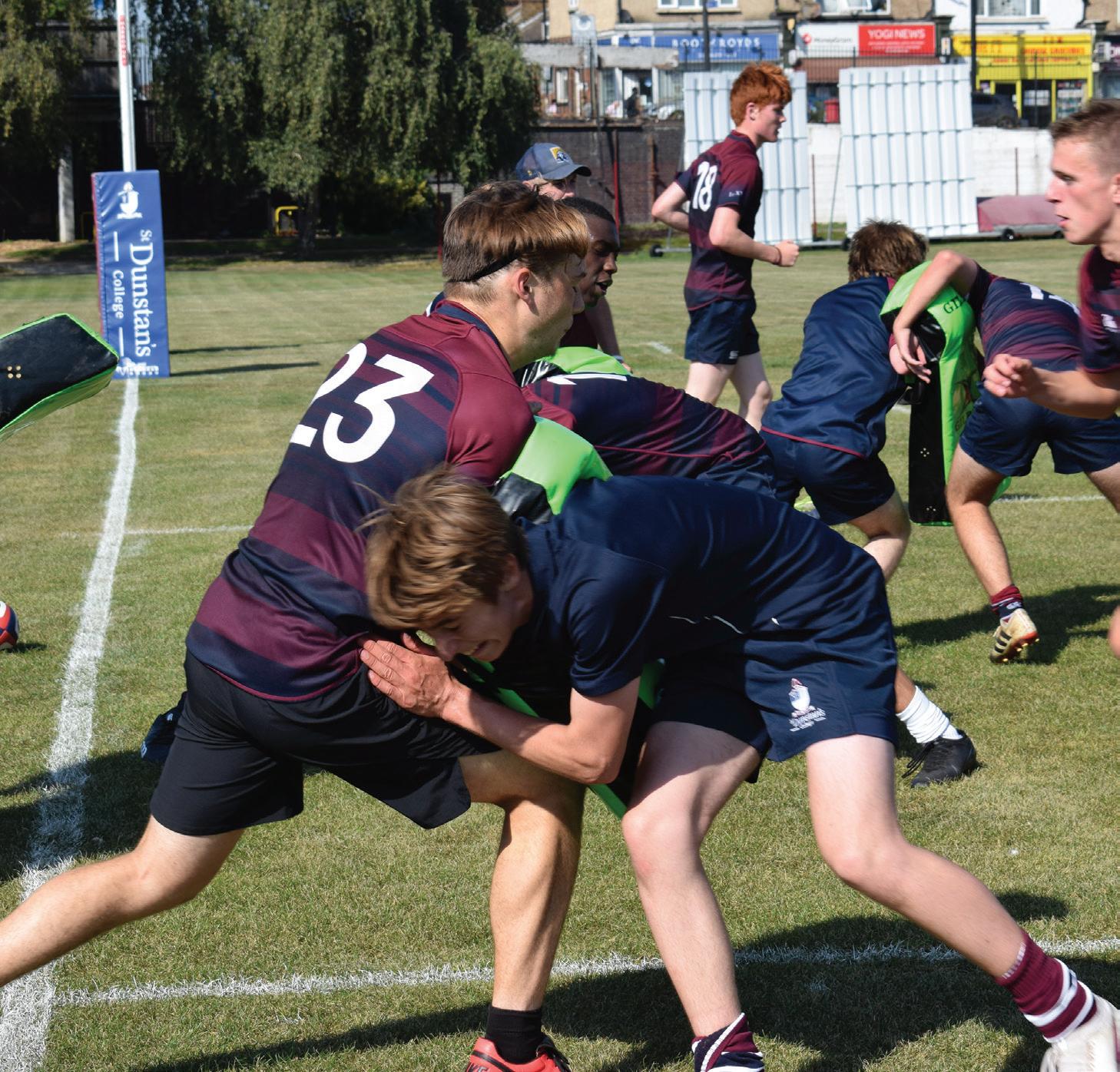
Co-curricular and Enrichment
There are a broad range of clubs available within the Sports Department to support students with Component 03 from Swimming to Rock Climbing. In addition to this, students will have the opportunity to experience a range of workshops to supplement their understanding such as BodyWorlds to gain a greater insight to the Anatomy & Physiology of the Human Body!
further study in all areas. Students who have studied A Level Physical Education have often gone on to their first-choice courses in Higher Education, taking a wide range of subjects from Sports Science to Physiotherapy at institutions such as Bath, Birmingham, Exeter and Loughborough.
22 ST DUNSTAN’S COLLEGE I GCSE OPTIONS 2023
Assessment Component Marks Duration Weighting Physical factors affecting performance (01) 60 1hr 30% Socio-cultural issues and sports psychology (02) 60 1hr 30% Performance in physical education (03) - NEA 80 - 40%
Religion, Philosophy and Ethics
AQA Religious Studies
Content
Component 1(A): The Study of Religion
Christianity
Students study the beliefs, teachings and practices of Christianity below and their basis in Christian sources of wisdom and authority.
Beliefs: Nature of God and the Trinity, Creation, Afterlife, Life of Jesus Practices: Worship, Sacraments, Festivals, the Church in the community
Islam
Students study the beliefs, teachings and practices of Islam and their basis in Islamic sources of wisdom and authority.
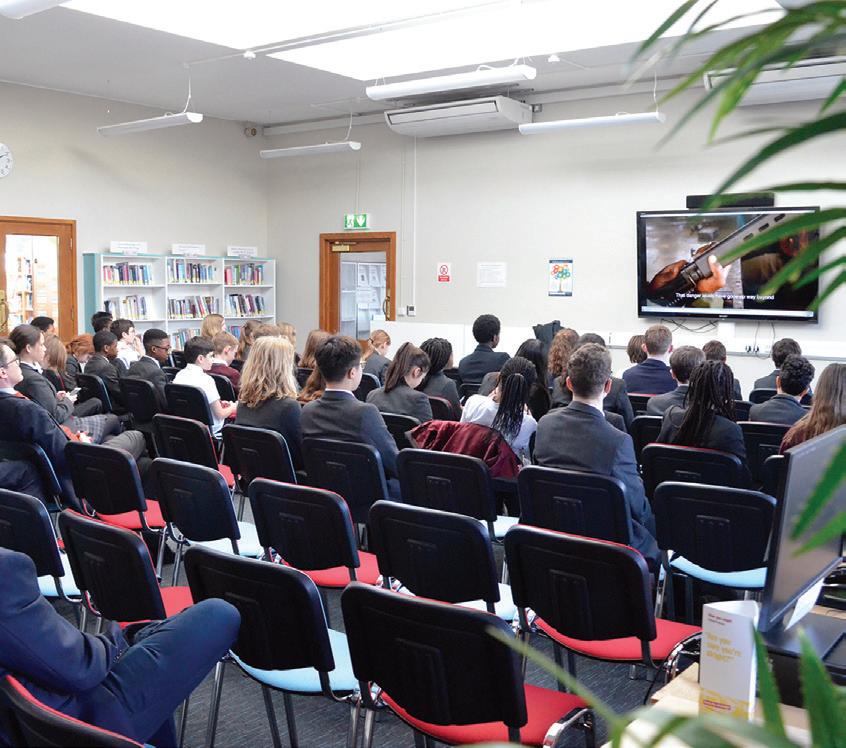
Beliefs: Six Articles of Faith, Five Roots of Usul ad-Din, Nature of Allah, Angels, Akhirah, Sources of Wisdom and Authority Practices: The Five Pillars, Ten Obligatory Acts, Jihad, Festivals
Component 2(A): Thematic studies in Philosophy and Ethics
Theme B – Religion and Life
The origins and value of the universe: Origins of the universe, environmental attitudes, use and abuse of animals.
The origins and values of human life: Origins of life, abortion euthanasia, afterlife
Theme C – The existence of God and revelation
Philosophical Arguments: Design Argument, Cosmological Argument, Miracles, The Problem of Evil, Religion vs. Science.
Nature of the divine and revelation: Special and general revelation
Theme D – Religion, peace and conflict
Violence, Terrorism and War: Peace, justice, forgiveness, reconciliation, terrorism, Just War Theory, pacifism
21st Century Conflict: Nuclear weapons and weapons of mass destruction
Theme E – Religion, crime and punishment
Crime and its causes: Good and evil intentions and the reasons for different types of crimes.
Punishment: The aims of punishment, treatment of criminals, forgiveness, capital punishment.
Assessment
The AQA syllabus is a full GCSE course assessed through two 1 hour 45 minute examination papers, each worth 50% of the overall GCSE grade. There is no coursework in this specification.
2 written papers:
- Each paper = 1 hour 45 minutes
- Each paper = 96 marks + 6 SPaG marks
- Each paper = 50% of GCSE
Questions: Each religion has a common structure of five-part questions of 1, 2, 4, 5 and 12 marks.
Teaching Methodology
RPE is a subject where you are awarded not only for what you know but for the strength of your argument. We therefore spend time honing debating and critical analysis skills and exploring issues that have no right or wrong answer. Students relish this ability to learn and achieve through discussion! Each student will have 5 lessons a fortnight with a specialist RPE teacher. Lessons will address both specification content as well as specific exam technique to ensure success in the final exams.
Co-curricular and Enrichment
We provide a variety of enrichment opportunities through the Forder programme including Junior and Senior Philosophy societies where GCSE students enjoy taking a lead in some of the discussions, a philosophical film club and, our RPE Magazine ‘Telos’. There will also be opportunities outside of the classroom for GCSE students to attend conferences where they debate issues of life, death, truth and, secularism with other students from around the country as well as trips to local places of worship. We also regularly welcome guest speakers from Christianity, Islam and Humanism to provide additional insight into the diverse perspectives across modern British society.
Progression after GCSE
A significant number of students continue with RPE to A Level, but the fact the GCSE trains students to argue confidently and analytically is a skill highly valued by other essay subjects at A Level such as English, History, Geography, Classical Civilisation, Economics, and Business. This is why RPE is known as the Queen of all the Humanities! It is valued by universities as a subject that encourages clarity of articulation, appreciation and analysis of alternative perspectives and, the development of empathy and tolerance.
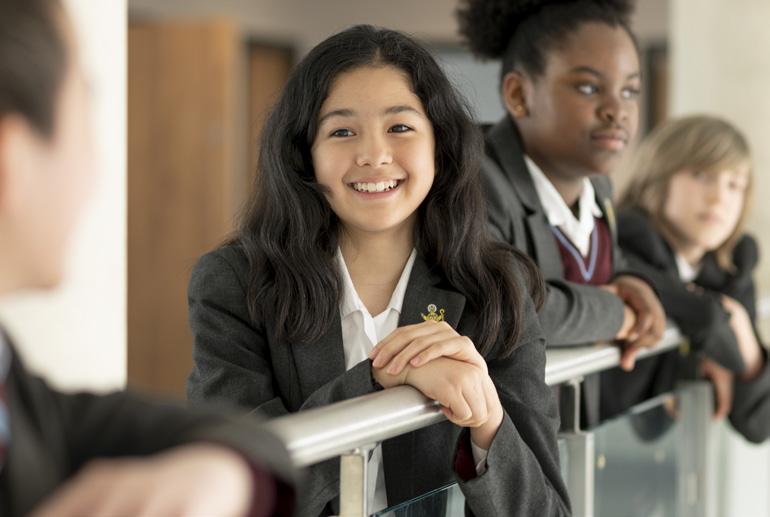
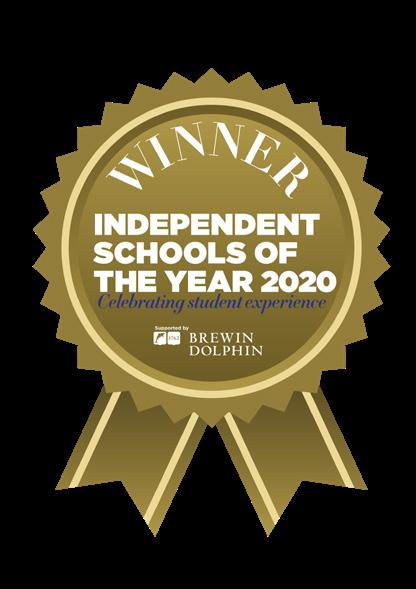



Stanstead Road, London SE6 4TY Charity number: 312747 A co-educational, independent College for ages 3 to 18 www.stdunstans.org.uk 020 8516 7200



















































